
|
January
31,
2015
-
No.
5 New
Legislation Sanctions Use of
|
 Bill C-38 in 2012 was the Harper government's first omnibus budget bill. |
To say the least, this government and media budget drivel is poppycock! The people should not be fooled just because the ruling elite keep repeating their budget idiocy year after year. Think about it. Public education, public health and infrastructure, government, the military, judicial system, prisons and more cannot be constrained within a single omnibus entity, let alone within something that expresses itself in an indistinguishable relation between revenue and expenditures. The sectors have little in common, especially their economic realities. They are not vague particularities to be lumped together as a collective expenditure demanding a corresponding revenue; they are as different as a hug and a slap.
The public education and health care sectors produce value and add that value to the economy. This value should be realized directly in the economy, as social human transferred-value. Public infrastructure likewise produces value and adds it to the economy, which should be realized directly from the economy as social material transferred-value. The public education, health care and infrastructure sectors do not require revenue from taxation; they require revenue from their value being realized in exchange for other value produced within the economy similar to other commodities produced privately or publicly, such as the movement of Canada Post's letters and parcels, which generate revenue in exchange for the produced value.
The military, judicial system, prisons and government do not produce value; they consume value, which must be taken from the economy as a tax on produced value. The military requires revenue from the economy, not in exchange for value it does not produce, but merely to exist!
 The sectors within the
federal budget are as different
as the moon is to a
turtle and need meticulous care and attention to their particular
qualities. For
starters, each sector must have its own place in the sun, where its
qualities and
particularities are discussed and problems resolved. For example,
public
education (and health care and infrastructure etc.) should have their
own
departments and accounts. The value they produce should be realized
directly
in exchange within the economy and not through taxes. Realization of
publicly-produced value should be accomplished directly in exchange
with
those enterprises active in the economy that consume the work-time of
educated and healthy workers, as social human transferred-value, and
which
consume the material transferred-value of public infrastructure. This
should
eventually lead to the public education, health care and infrastructure
sectors
being established as separate public enterprises run by the workers
involved
and other concerned Canadians determined to guarantee the well-being,
needs
and security of all Canadians and the general interests of society.
The sectors within the
federal budget are as different
as the moon is to a
turtle and need meticulous care and attention to their particular
qualities. For
starters, each sector must have its own place in the sun, where its
qualities and
particularities are discussed and problems resolved. For example,
public
education (and health care and infrastructure etc.) should have their
own
departments and accounts. The value they produce should be realized
directly
in exchange within the economy and not through taxes. Realization of
publicly-produced value should be accomplished directly in exchange
with
those enterprises active in the economy that consume the work-time of
educated and healthy workers, as social human transferred-value, and
which
consume the material transferred-value of public infrastructure. This
should
eventually lead to the public education, health care and infrastructure
sectors
being established as separate public enterprises run by the workers
involved
and other concerned Canadians determined to guarantee the well-being,
needs
and security of all Canadians and the general interests of society.
The federal budget is a fraud! No amount of tinkering will turn this sow's ear into a silk purse. A new approach and thinking on the economy and a human-centred pro-social direction are necessary.
Crisis of Canadian Federalism Deepens
The crisis of the power sharing arrangements in Canada between the federal and provincial governments continues to deepen as fights over control of resources and public funds become increasingly acute and shrill. The sharp contradictions revealed themselves clearly in the preparations for the meeting of the Council of the Federation which took place in Ottawa on January 30. The wheeling and dealing and factional alignments and realignments have erupted into an open battle for everyone to see.
The Council of the Federation comprises all 13 provincial and territorial Premiers. It usually meets twice a year and is said to enable Premiers "to work collaboratively, form closer ties, foster constructive relationships between governments, and show leadership on important issues that matter to Canadians." But less than a week before Friday's meeting began, two western Premiers, Alberta's Jim Prentice and Saskatchewan's Brad Wall, advised that they would not attend. Wall claimed he is committed to cutting travel costs and would follow proceedings over the phone and Prentice sent his Minister of Municipal Affairs in his place saying he was busy preparing a budget. Meanwhile, Harper has not attended a First Ministers' Conference since 2009.
Robert Ghiz, Premier of Prince Edward Island, who chaired the meeting, said that "Canada's economy continues to be a critical focus for Premiers and we will be discussing how we can leverage our economic competitiveness."
The meeting did indeed take
place at a time of great economic uncertainty.
News media have been filled with stories about the dire economic
consequences of falling oil prices and the political calculations of
the Harper
government in an election year including postponement of the budget by
the
federal government until April or May. However, the competing interests
among the Premiers over issues like pipeline projects,
transfer payments and infrastructure spending are so sharp, it is hard
to comprehend how they intend to "leverage their economic
competitiveness." It requires a vision for the society and
cooperation to realize that vision. Otherwise, the strongest provinces
squeeze out the weakest and prevail. This merely throws the purpose of
the federation out the window and underscores the need for a new
federation consistent with the conditions today.
The vision on the basis of which the previous power-sharing arrangements were made included transfer payments, equalization payments and universality to guarantee equal opportunity no matter where one lives in Canada. Today those arrangements no longer exist. The neo-liberal anti-social offensive prevails within which each province vies with the others and especially with the central authority over control so as to improve the competitiveness of the monopoly interests which operate in their provinces or federally. This is why the ongoing work that the Premiers decided to take up at their last meeting in August 2014 to develop a Canadian Energy Strategy is stymied.
While there are no provisions in the British North America Act of 1867 for First Ministers meetings, such meetings have been regularly used to discuss federal-provincial concerns and were considered to be a significant tool to sort out differences, operating through what was called "cooperative federalism" and other times through "executive federalism."
Peter McKenna, a professor and chair of political science at the University of Prince Edward Island, in a January 5 opinion piece in the Charlottetown Guardian, expressed concern about the absence of the Prime Minister from these meetings. He wrote, "These high-level get-togethers are important in terms of meeting the myriad challenges of a large and complex federation like Canada's. It is obviously critical for first ministers, including the prime minister, to meet at least once a year to engage in face-to-face discussions or negotiations."
 McKenna said that "there has
been a regrettable tendency on the part of
the Harper government to rely on reference cases and the Supreme Court
of
Canada to resolve federal-provincial disagreements. But this is not the
optimal
way of dealing effectively with intergovernmental disputes and
differences in
Canada."
McKenna said that "there has
been a regrettable tendency on the part of
the Harper government to rely on reference cases and the Supreme Court
of
Canada to resolve federal-provincial disagreements. But this is not the
optimal
way of dealing effectively with intergovernmental disputes and
differences in
Canada."
Harper's refusal to attend the meetings certainly
demonstrates his refusal to negotiate anything. However, it does not
explain that this fight over the state power is getting sharper as
private interests take over the functions of the state at both the
federal and provincial levels and it is the inter-monopoly and
inter-imperialist interests which are being fought out at the expense
of Canadians from coast to coast to coast.
Canadian federalism which was based on the notion of a centralized power shared in a definite way with the provinces and territories, no longer functions. Not only is the Canadian economy being fully integrated into the United States of North American Monopolies, but so too the economies of each province. How this will unfold is the subject of the interprovincial and provincial-federal fights.
What It Means to "Leverage Economic Competitiveness"
The recent formation of a so-called Central Canada Alliance between the governments of Quebec and Ontario, which are both Liberal majority governments, is for purposes of using their considerable power to advance their plan to transform central and eastern Canada into a huge network of energy corridors and gateways, with pipelines, railways, intermodal trucking and warehousing. This is to convert Quebec and Ontario into a massive hub, linking the European monopolies to the so-called North American economy and Asia and the North American monopolies to Europe. Premiers Prentice and Wall want to do a similar thing in western Canada. They champion the corridors which link the resources of Alberta and Saskatchewan and the private interests that have usurped control over them with the U.S. Gulf Coast and Asia. They are also desperate to make inroads into the markets in eastern Canada.
Another cause for crisis and disunity is the
Comprehensive Economic
Trade Agreement with the European Union (CETA) which the Prime Minister
is secretly negotiating but which all provinces will have to ratify.
Newfoundland and Labrador Premier Paul Davis has publicly denounced
Harper for refusing to live up to his commitment to provide $280
million to
the Fisheries Investment Fund in return for the province giving up
minimum
processing requirements as a concession to Europe in CETA negotiations.
Premier Davis recently stated, "When the time comes, if we have to
withdraw
our support for CETA, we'll withdraw our support for CETA. Our support
is
contingent on Prime Minister Harper providing that fund. That's the
agreement
that we have."
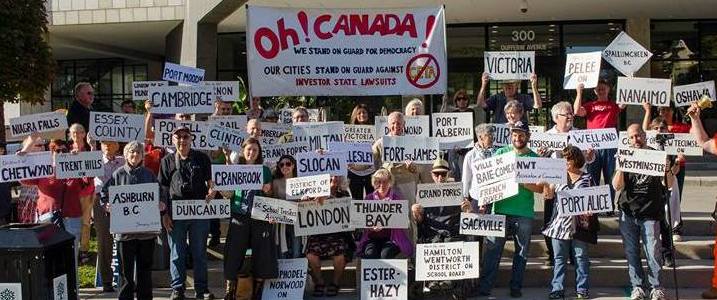
London, Ontario demonstration against CETA, September 25, 2014 names cities
across the country which have taken a stand against CETA.
This underscores that no provincial authority will accept the federal authority being the sole arbiter of which monopolies are to benefit from trade deals, infrastructure projects and the like. For its part, the federal government has its own soul to sell in the secret deals it makes using the resources of Canada and the federal and ministerial prerogatives in the way it sees fit. All of it creates a very dangerous situation as Canada is dragged into the civil war which has broken out in all earnest in the United States as contending authorities in Canada line up behind the contending authorities in the United States. Canada is being embroiled in U.S. imperialist wars of aggression and occupation as the U.S. strives to control Europe and dominate Asia as well as enforce its control over the Americas and the Caribbean.
Contradictions Between Federal and Provincial Governments
The sharp contradictions between the federal and provincial governments continued throughout the Conference. A concluding statement emphasizes the concerns of the provincial Premiers for the federal government to invest more in infrastructure projects. "United in their efforts to drive economic growth, Premiers committed to continue investing in strategically important public infrastructure and called for a stronger commitment from the federal government and greater federal funding," their statement said.
Federal Minister of Finance Joe Oliver issued a strongly worded statement ridiculing the position of the Premiers. "The opposition and some Premiers appear oblivious to the consequences of the current global instability and the dramatic decline in the price of oil," Oliver said.
Premiers called Oliver's position economically unsound. Ontario Premier Kathleen Wynne replied, "I believe that the response that Mr. Oliver has given so quickly to our discussion really demonstrates, in my opinion, that the oblivion is not on the part of the Premiers. The oblivion actually is on the part of the federal government."
During their meeting, the Premiers highlighted some other areas where the federal government has off-loaded its responsibilities to the provinces. On Disaster Financial Assistance, the Premiers expressed their disappointment with changes, effective February 1, 2015, which will reduce the federal share of future disaster assistance costs. The Premiers asked that these proposed changes not be implemented.
Premiers also expressed
strong support for the National Roundtable on
Missing and Murdered Indigenous Women and Girls to be held, organized
by
some national aboriginal organizations. They encouraged federal
ministers to
participate.
While there was a lot of discussion at the conference on areas of concern including fiscal arrangements, health care, jobs and skills, infrastructure, disaster financial assistance and Aboriginal issues, the Premiers do not seem to have made much progress. This is especially true in the case of the much touted Canadian Energy Strategy which the last Premiers' meeting in August 2014 decided was urgent. The communique from this meeting reiterates the Premiers' commitment to "completing the Canadian Energy Strategy."
Accommodation and Power-Sharing Are Finished
To speak of "power-sharing" between the federal and provincial levels of government today makes no sense. Not only are the power-sharing arrangements entered into at the time of Confederation in 1867 finished, but so are the renewed arrangements established in the post-World War II period in the form of a social welfare state. The striving for domination of the competing interests has become cut-throat. Which markets get Canada's resources and the transportation routes and means to get them there have become very thorny problems along with who will pay for all of this. The fights over who controls the wealth created by the working class and people of this country are not only very sharp but the degree of theft of public funds to pay the rich is unprecedented.
The Premiers' meeting did not contribute to solving any of these pressing matters. This is what the communique they issued underscores.
The lack of vision and the fact that none of these problems are being addressed or even recognized, indicate that a new nation-building project is needed. Such a project is required to change the direction of the economy and establish a public authority that ensures the needs of the people are provided with a guarantee and engages in trade for mutual benefit.
Canada's Growing Role in U.S.-Led Cyber Warfare
and
State
Surveillance
Information has recently emerged about Canada's growing involvement in U.S.-led cyber warfare and state surveillance. Details of the Communications Security Establishment (CSE) project known as "LEVITATION" were revealed in a 2012 document provided by former U.S. intelligence contractor Edward Snowden to U.S. news website The Intercept, which analyzed the document in collaboration with CBC News. LEVITATION is part of the global state surveillance program known as ECHELON or Five Eyes led by the U.S. National Security Agency (NSA), in which the U.S., the UK, Canada, New Zealand and Australia collaborate in espionage and surveillance against foreign companies and governments, and each other's citizens.
 According to the document, Canada can access
data from 102 free file
hosting sites, though only three companies are named: Sendspace,
Rapidshare
and Megaupload, the last of which is no longer online.[1]
Such sites
are
typically used to share photos, videos, music and documents. The
document
says that access to the data comes from unnamed "special sources," a
term that
in previous documents from Snowden seemed to refer to
telecommunications
companies or cable operators, CBC News notes. However, U.S.-based
Sendspace told CBC News that "no organization has the
ability/permission to
trawl/search Sendspace for data," and its policy states it will not
disclose user
identities unless legally required. The document does not indicate if
any
companies are aware of the LEVITATION surveillance program. The
Intercept writes, "LEVITATION does not rely on cooperation from
any
of the file-sharing companies. A separate secret CSE operation
codenamed
ATOMIC BANJO obtains the data directly from internet cables that it has
tapped into, and the agency then sifts out the unique IP address of
each
computer that downloaded files from the targeted websites."
According to the document, Canada can access
data from 102 free file
hosting sites, though only three companies are named: Sendspace,
Rapidshare
and Megaupload, the last of which is no longer online.[1]
Such sites
are
typically used to share photos, videos, music and documents. The
document
says that access to the data comes from unnamed "special sources," a
term that
in previous documents from Snowden seemed to refer to
telecommunications
companies or cable operators, CBC News notes. However, U.S.-based
Sendspace told CBC News that "no organization has the
ability/permission to
trawl/search Sendspace for data," and its policy states it will not
disclose user
identities unless legally required. The document does not indicate if
any
companies are aware of the LEVITATION surveillance program. The
Intercept writes, "LEVITATION does not rely on cooperation from
any
of the file-sharing companies. A separate secret CSE operation
codenamed
ATOMIC BANJO obtains the data directly from internet cables that it has
tapped into, and the agency then sifts out the unique IP address of
each
computer that downloaded files from the targeted websites."
The LEVITATION program can access information on about 10 to 15 million uploads and downloads of files from these websites each day, the document says "in several countries across Europe, the Middle East, North Africa, and North America," The Intercept reports.
 LEVITATION is said to be used for
tracking "extremists" who the
document states use such websites to share propaganda and training
materials.
To find such files, the document says CSE must first weed out other
content
unrelated to terrorism. Analysts find some 350 "interesting download
events"
each month, less than 0.0001 per cent of the total collected traffic,
according
to the document. The metadata from a file can be used to map out a
day's
worth of a user's online activity by inputting this information into at
least two
databases created by other Five Eyes members. Governments could then
potentially identify the person who uploaded or downloaded the file,
further
track their online activities and any "new suspicious documents." The
CBC
report states, "After doing its research, the LEVITATION team then
passes on
a list of suspects to CSE's Office of Counter Terrorism."
LEVITATION is said to be used for
tracking "extremists" who the
document states use such websites to share propaganda and training
materials.
To find such files, the document says CSE must first weed out other
content
unrelated to terrorism. Analysts find some 350 "interesting download
events"
each month, less than 0.0001 per cent of the total collected traffic,
according
to the document. The metadata from a file can be used to map out a
day's
worth of a user's online activity by inputting this information into at
least two
databases created by other Five Eyes members. Governments could then
potentially identify the person who uploaded or downloaded the file,
further
track their online activities and any "new suspicious documents." The
CBC
report states, "After doing its research, the LEVITATION team then
passes on
a list of suspects to CSE's Office of Counter Terrorism."
The CBC reports that the document cites just two successful instances in which information of interest was produced through this surveillance. "It's unclear from the leaked document how long LEVITATION was operational and whether it is still in use," the CBC report adds. The Intercept writes that it is also unclear whether these "successes" actually prevented any terrorist attacks.
Furthermore, security experts and studies of such mass state surveillance indicate that they make no significant contribution to stopping terrorism. Adam Molnar, a Canadian security expert teaching at Deakin University in Australia told CBC News, "We've focused too much on bulk collection just because there's a capacity to survey broad swaths of digital communication and collect it and store it, potentially indefinitely." He added that this surveillance may not only be harmful to privacy and civil liberties, but ineffective as well. "Even in instances where we see an attack occur, these agencies are drowning in data and they're not even able to follow up on specific leads," he said. Molnar cites the 2013 Boston Marathon bombing and the recent Paris attacks as cases where information was gathered on suspects, "but it made very little difference."
CBC News also reports that the non-profit New America Foundation analyzed 225 terrorism cases inside the U.S. since the September 11, 2001 attacks and found that bulk collection of phone records by NSA had "no discernible impact" on preventing acts of terrorism. According to its analysis, the organization said the bulk collection of phone metadata had only marginal impacts on preventing terrorist-related activities, and that in most cases it was traditional law enforcement and investigative methods involving a tip or evidence that resulted in initiating action against an individual or group. The CBC report adds that this report corroborates the findings of a White House-appointed review committee. This committee said that much of the evidence that NSA turned up from tracking phone calls could have "readily been obtained" using standard court orders. It found that the phone metadata collection program was "not essential to preventing attacks."
The fact that these spy agencies are totally unaccountable is a profound threat to the rights and freedoms of not only Canadians but the peoples of the world who do not accept the status quo where they are deprived of political power and are organizing for pro-social political arrangements. The self-serving definition of terrorism used by the reactionary ruling circles is precisely meant to criminalize the progressive forces and their resistance, while hysteria about "extremists" and "radicals" is used to justify such measures that violate rights.
For example, the Guardian reports that the CSE's UK counterpart, the Government Communications Headquarters (GCHQ), collected emails to and from journalists working for some of the largest American and British media outlets, ostensibly as part of a "test exercise." The story, also based on Snowden documents, says GCHQ has also listed investigative journalists as a "threat" who rank somewhere between terrorists and hackers.
Tamir Israel, a lawyer with the University of Ottawa's Canadian Internet Policy and Public Interest Clinic, points out that a similar issue could arise in Canada, with people being targeted who have nothing to do with terrorism. Academics, lawyers, journalists, activists and business people commonly use file-hosting sites as part of their jobs and it is "completely at the discretion of CSE essentially what documents to pick," Israel says.
Despite being barred from doing so, CSE is already known to have carried out surveillance of 66 Canadians through the LEVITATION program alone, "but concluded there was no sign of unlawful practice." Except of course for CSE's own illegal surveillance of Canadian citizens. This impunity must not pass.
Note
1. Megaupload was taken down by the U.S. Department of Justice in January 2012 because of violations of U.S. copyright law, despite the fact that the company was based in Hong Kong, and many of its executives based in New Zealand, outside of U.S. jurisdiction.
(With files from CBC News, The Intercept, Toronto Star)
Federal Government Sued over Solitary Confinement
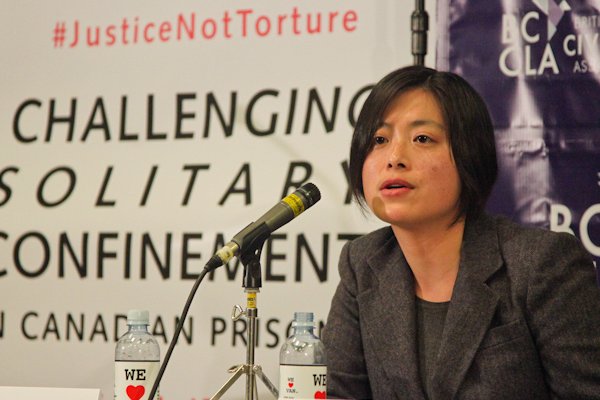 Carmen Cheung of the BC Civil Liberties Association speaks at launch of lawsuit. |
On January 19, the BC Civil Liberties Association (BCCLA) and the John Howard Society of Canada launched a lawsuit against the federal government for the use of administrative segregation in Canadian prisons, saying the practice violates prisoners' charter rights to life, liberty and security of the person. The groups say the trial could begin in BC Supreme Court as early as 2016. The lawsuit follows several high-profile prison suicides coming to light that were linked to solitary confinement.
"Indefinite solitary confinement has been classified by the United Nations as torture. It's been called by the Canadian Human Rights Commission cruel and unusual punishment. There's been study after study saying that this needs to be eliminated," said Josh Paterson, the association's executive director. "This practice of holding people indefinitely and for prolonged periods of time in solitary is unconstitutional." At any given time, as many as 1,800 inmates are in solitary confinement in provincial or federal institutions, Paterson added, describing the practice of complete isolation lasting up to 23 hours a day for months or even years at a time. One former prisoner reported that a five-day stint in solitary turned into 100 days because of a shortage of beds at the prison.
Julia Payson, head of the John Howard Society of British Columbia, described prolonged segregation as a risk factor for suicide behind bars. "Solitary confinement can exacerbate pre-existing mental illness and in fact can create mental illness where none previously existed," she said. "It seems cruel and contrary to our rehabilitative objectives that our solitary confinement practices would result in people leaving our prisons mentally ill or with more serious mental illnesses than when they entered."
Recent suicides related to solitary confinement include 24-year-old Edward Snowshoe, who killed himself in 2010 after spending 162 days in segregation, as well as Ashley Smith, an emotionally disturbed teenager who died in solitary confinement through self-induced choking in 2007. Smith's death was later ruled a homicide, though the federal government ultimately rejected an inquest's core recommendations to end solitary confinement and ban segregation for more than 15 days.
Jason Tamming, spokesman for Public Safety Minister Steven Blaney, said Correctional Service Canada uses all of its tools, including segregation, to make sure the system actually corrects criminal behaviour. Tamming went on to say that the Harper government's "efforts will continue to be focused on the victims of crime."
For its part, Corrections Canada describes solitary confinement as a measure of last resort.
"We recognize that there are some very limited circumstances in which resorting to confining prisoners may be necessary," said Paterson when asked about whether calling for a restriction on the practice would deprive prison officials of a necessary tool. "But that confinement needs to be for the shortest duration possible and there needs to be a fair process around that confinement."
Breese Davies, Vice-President of the Criminal Lawyers' Association and counsel at the Ashley Smith inquest, in a January 17 op-ed for the Toronto Star, points out the many problems with the use of solitary confinement in the current system:
"Correctional officials like to refer to solitary confinement as 'administrative segregation.' Let's not be fooled. The label does not matter. Solitary confinement, administrative segregation, intensive psychiatric care, medical observation -- in prison, they all involve intensive, debilitating isolation.
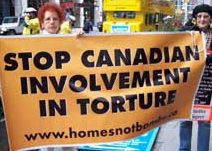 "Solitary confinement has a
long history. It was invented generations ago
by ivory tower theorists and clerics in the hope that prisoners would
use their
time to reflect on their lives and dedicate themselves to
self-improvement. But
it has always been a tool of control and punishment. In theory,
solitary is
reserved for rebellious or violent prisoners. In reality, it is a
warehouse for the
vulnerable, those with intellectual disabilities and those with
disabling mental
health issues or those who are simply difficult to 'manage.'
"Solitary confinement has a
long history. It was invented generations ago
by ivory tower theorists and clerics in the hope that prisoners would
use their
time to reflect on their lives and dedicate themselves to
self-improvement. But
it has always been a tool of control and punishment. In theory,
solitary is
reserved for rebellious or violent prisoners. In reality, it is a
warehouse for the
vulnerable, those with intellectual disabilities and those with
disabling mental
health issues or those who are simply difficult to 'manage.'
"In a recent report, the Correctional Investigator described solitary confinement succinctly as a 'default population management strategy.' And so it is. Almost one-quarter of the 21,000 individuals who passed through the federal prison system in 2014 spent time in solitary confinement. Roughly one-third of those spent more than 60 days in isolation.
"It gets worse. Star readers learned last week that many mentally or physically ill prisoners at the province's new Toronto South Detention Centre are being lodged in isolation cells because the institution's infirmary and mental health unit will not be open until spring -- well over a year after the rest of the jail opened.
"The situation at the Toronto South Detention Centre is particularly indefensible in that people are there awaiting trial. These individuals are presumed innocent. They have not been found guilty of anything, yet they suffer the hardship of solitary confinement because they were unable to secure bail.
"Perhaps worse yet, the federal penitentiary system makes no pretext of trying to do better; it unabashedly flouts criminological research and wisdom at every turn. Witness its recent, long-awaited response to the findings of an inquest jury into the penitentiary death of Ashley Smith. The government refused such key recommendations as the need to remove those with mental health issues from prison, and to keep prisoners no longer than 15 consecutive days in solitary confinement. The practice, it said, is too administratively useful to be dispensed with.
"What the inquest jurors appreciated -- yet, prison officials are apparently untroubled by -- is a growing recognition that solitary confinement is tantamount to torture. A United Nations Special Rapporteur reached the same conclusion in 2011, stressing that isolation should never be used for youth and those with mental health issues; and, that the sustained use of solitary confinement violates the International Covenant Against Torture and the Covenant on Civil and Political Rights.
"Why the current furor about a practice that dates back to 1820? Because we are becoming increasingly aware that human beings are social creatures who rapidly deteriorate in conditions of isolation. Any notion that solitary confinement leads to rehabilitation is absurd. Rather, it leads to anger, paranoia and self-harming behaviour. Minds decay. Brains atrophy. The human spirit is extinguished. Anxiety and depression run rampant. For those who have mental health issues, who make up 15 to 20 per cent of the prisoner population, segregation is particularly harsh.
 "We can no longer ignore
the inhumane reality of segregation, as much as
the prison authorities would like to keep this practice out of public
view and
off the political radar. It is difficult to truly understand how a
policy so
ineffective and cruel has thrived for so long. Few votes are likely to
be cast
in this election year based on reforming outdated prison policy. Still,
pressure
for reform is mounting. In a country that prides itself on being at the
forefront
of social progress and human rights, politicians who favour the current
addiction to punishment and imprisonment, especially solitary
confinement,
must be called to account."
"We can no longer ignore
the inhumane reality of segregation, as much as
the prison authorities would like to keep this practice out of public
view and
off the political radar. It is difficult to truly understand how a
policy so
ineffective and cruel has thrived for so long. Few votes are likely to
be cast
in this election year based on reforming outdated prison policy. Still,
pressure
for reform is mounting. In a country that prides itself on being at the
forefront
of social progress and human rights, politicians who favour the current
addiction to punishment and imprisonment, especially solitary
confinement,
must be called to account."
This lawsuit and discussion about the need to end solitary confinement because it constitutes torture are taking place in the context of the Harper government's recent changes to the justice system. These changes increased mandatory minimum sentences for various offences and removed discretionary powers of prosecutors and judges to seek and give sentences to actually facilitate rehabilitation and reintegration into society, again putting the focus on increased jail time for those convicted. Certainly, responsibility for the overcrowding of jails and the subsequent misuse of solitary confinement for long-term incarceration because of lack of proper cells can be placed squarely at the feet of the Harper government and its imposition of a crime and punishment/revenge and retribution outlook on the justice system. This outlook also denies that people are born into society, and that not only are human beings inherently social, as Breese Davies points out, but that society is responsible for the well-being of its members, including the provision of humane treatment and appropriate rehabilitation for those who are incarcerated.
The lawsuit is just in affirming fundamental rights
that are being thrown in the mud by the Harper government's "law and
order" regime. It is timely given the Harper government's escalating
offensive against the rights of the people through its anti-terrorist
legislation which threatens to further criminalize and jail citizens
and residents. The Harper government must be held to account.
(With files from Canadian Press, Toronto Star.)
Freedom of Speech of the Reactionary Ruling Classes
Hypocrisy, Hysteria and Historical Falsification
Around
the Attacks
Against Charlie Hebdo
The terrorist attack
against Charlie Hebdo has
resulted
in
a
huge
wave
of
sympathy
and
opposition
to
terrorist
attacks.
These just
actions
are positions of principle, as are the demonstrations of Muslim peoples
demanding that the Prophet Muhammad not be caricatured. Blasphemy is a
social act -- an act directed toward someone else and their beliefs,
which all
persons whether religious, atheist or agnostic must respect. Without
this
respect, there is no discussion possible.
As with any event, the bourgeoisie advances its pawns. It presents itself as democratic, defending of freedom of speech, for peace, etc. In reality, it is doing the exact opposite. It muzzles scientists, cuts subsidies to organizations critical of its policies, militarizes the police against its own people, engages more and more in military adventures, etc.
The bourgeoisie is presented as the successor of the Enlightenment and Voltaire who reportedly said, "I do not agree with what you say, but I will defend to the death your right to say it." Philosophers, who claim to have grown up on a diet of Voltaire, have come forward to support this assertion. But this sentence was never uttered by Voltaire. It is Evelyn Beatrice Hall, who falsely attributed it to Voltaire in an article, as she herself admits.[1]
Voltaire wrote his 1763 "Treatise on Tolerance" about the case of the death sentence and execution of Jean Calas, father of a Huguenot family, on March 10, 1762, to oppose the religious massacres of the time, especially those carried out by the Jesuits against the Huguenots. In Toulouse especially, this story caused all sorts of slanders and insults against the family, including calls for the death of the mother, the son, the parents and even the servant of the Calas family. After a lengthy analysis of religions throughout history and civilizations, he concluded that intolerance is not the fruit of religion, but of property. He said, among other things, "Seek not to vex the hearts of men, and they are yours."[2] He also wrote other books that dealt with blasphemy as a social act.
This is a far cry from the way the bourgeoisie uses Voltaire in the present and today's reality.
Another thing that the bourgeoisie says to justify the existence of a magazine like Charlie Hebdo is that cartoons are the means of expression of the people, that they have existed forever in France, during the French Revolution, etc. As always, the bourgeoisie presents things as absolute, beyond classes and the future of society. During the French Revolution, there were cartoonists on both sides. The monarchy had its own, such as James Gillray or Boyer de Nimes.
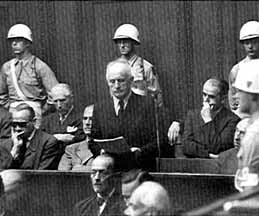 Julius Streicher makes final statement before his sentencing at Nuremberg Tribunal. |
One of the finest examples of the class character of caricature is the newspaper Der Stürmer, a Nazi weekly newspaper published by Julius Streicher starting in 1923. Der Stürmer used very entertaining content, pornography, cartoons and anti-capitalist appeals. In addition, in each paper and in each of its editions, Der Stürmer included in large letters at the bottom of the first page: "Die Juden sind unser Unglück" meaning "The Jews are our misfortune." He worked on building what Jeffrey Herf calls an anti-Semitic consensus.
Although Julius Streicher was not involved in the Nazi government apparatus or in the German armed forces, he was tried by the Nuremberg Tribunal where he was convicted of crimes against humanity and sentenced to death on October 1, 1946. The judgment reads in part, "In his speeches and articles, week after week, month after month, he infected the German mind with the virus of anti-Semitism, and incited the German people to active persecution. [...]
"Streicher's incitement to murder and extermination at the time when Jews in the East were being killed under the most horrible conditions clearly constitutes persecution on political and racial grounds in the context of war crimes, such as defined by the Charter, and constitutes a crime against humanity."
Can we then mock anything? Jokes against minorities, those who are persecuted (such as Muslims today), the downtrodden, desperate, destitute and the homeless are barbarism, not satire. The same goes for jokes against women, which seek to drag society back to a time when women were not equal to men.
To mock everything, as Charlie Hebdo claims it does today, amounts to sowing divisions amongst the peoples of the world. Such activity gives credibility to the bourgeois theory of the "clash of civilizations" promoted during the U.S. imperialist aggression against the peoples of the Middle East launched under Bush that has done so much harm to humanity.
Note
1.See: http://rue89.nouvelobs.com
2. Toleration and Other Essays 1775, Chapter "Whether Toleration Is Dangerous, and Among What Peoples It Is Found"
(Translated from original French by TML. Photos: A. Moran, Wikipedia.)
The Falsification of History
Auschwitz and Its Liberation
Where Is the Root of Polish Guilt?
The statement by Polish Foreign Minister Grzegorz Schetyna, claiming that it was Ukrainians alone who allegedly liberated the prisoners from Auschwitz, needs no further comment. We'll let that remark lie on its author's conscience, as he seems to have "forgotten" about the thousands of his own countrymen who fought heroically against fascism as part of the Armia Ludowa. In the end, Schetyna's revisionism merely echoes the long-established opinions of some nationalist Polish historians. For example, back in 2005 the late Pawel Wieczorkiewicz, a former professor at the History Institute of Warsaw University, was quoted in the newspaper Rzeczpospolita as saying that he felt it would have been helpful to have had an alliance between Nazi Germany and Poland.
"We might have found our place on the side of the Third Reich, almost like Italy, and probably in a better position than Hungary or Romania. As a result, we could have been in Moscow, where Adolf Hitler and our Marshal Edward Rydz-Smigly together could have watched our victorious Polish-German troops parade before them."
That's nothing new, there's plenty of photographic evidence of the friendship between Polish nationalists and Nazis. Government officials simply agreed with the scholar's conclusions.
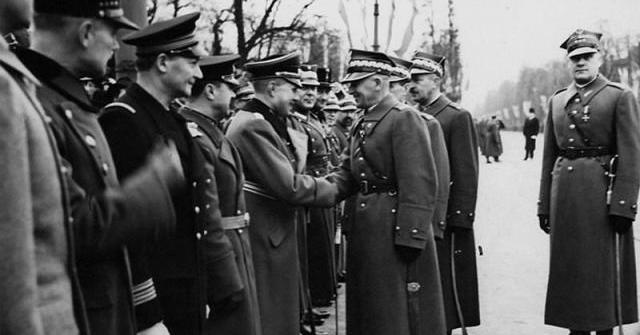
A handshake between Polish Marshal Edward Rydz-Smigly and German attache, Major General Bogislav von Studnitz, at the "Independence Day" parade in Warsaw, November 11, 1938.
Nevertheless, Schetyna's statement gives us a good reason to take a closer look at the data in the archives. Who did the Red Army, which included people of every nationality living in the Soviet Union (including Poles), expel from the liberated concentration camp? Let us peer through Mr. Schetyna's nationalist "glasses" and take a look at the ethnic composition of the collaborators who were guarding Auschwitz. Immediately we see that there is a great deal of evidence that ethnic Poles and Ukrainians (known as "Trawniki men") volunteered for duty in the execution brigades and as camp guards. Ethnic Germans, even those "devoted" to the SS, viewed such "work" with contempt. Many of the Polish-Ukrainian collaborators fled to Canada after the war. There they have been living out their lives in peace, and are now watching, no doubt awash in happy nostalgia, as their disciples, bearing torches, march triumphantly under the Wolfsangel rune in Kiev. Apparently this skeleton in the closet so haunted the professor and diplomat that the Polish Foreign Ministry grasped onto an alternative history. "They prefer to call themselves 'victims' and emphasize their own suffering under Soviet rule, ignoring the fact that they themselves exterminated Jews on a massive scale," notes Dr. Efraim Zuroff, a respected historian and the director of the Simon Wiesenthal Center office in Israel.
 Polish police officers in the Granatowa Policja, helped the Nazis at train stations and borders. |
Here is just a sampling of facts about precisely from whom the Red Army rescued the prisoners at Auschwitz. Information from the official archives of the Auschwitz-Birkenau State Museum proves that at various times the Blue Police ("Granatowa Policja") were made up of Polish collaborators who helped send people directly from train stations to Auschwitz.
The 1946 book, The Death Factory ("Továrna na smrt," Czech language), written by Auschwitz prisoners from Czechoslovakia (cited according to the Russian edition, State Publishing House for Political Literature, 1960, Moscow), tells about the "Polish prisoner doctor, Vladislav Doering" (pg. 112), who took part in the inhuman experiments conducted on prisoners, and about the barracks leader Stefan Wierzbic from Upper Silesia, who preferred to kill prisoners with "three blows of club" (pg. 53), and also describes the unique method of curing the ill with beatings "from the Polish prisoner doctor Zenkteller" (pg. 82).
The authors of this book identify as Polish fascists: the barracks leader Bruno Bronevich; Raportschreiber Kazimierz Gosk from Warsaw; Julius Miklus; and others (pg. 252-253). Many Polish names can be found in the list of the SS members who were guilty of particular brutality towards prisoners at Auschwitz (pg. 231).
Tadeusz Piotrowski, a well-known American professor of Polish origin, provides a good selection of sources on the subject of Polish collaboration at Auschwitz in his book, Poland's Holocaust: Ethnic Strife, Collaboration with Occupying Forces and Genocide in the Second Republic, 1918-1947. Among other matters, he relates about Polish blackmailers ("szmalcowniki"), who demanded money from Gypsies, Jews, and Communists, threatening that these "enemies of the Reich" would be otherwise shipped to Auschwitz.
So, while the Red Army and the Armia Ludowa partisans (which included ethnic Poles who were fighting the fascists) were liberating the country, what did those Polish collaborators, whose interests the Foreign Ministry in Warsaw has been so zealously defending, do? Why is Mr. Schetyna so committed to such defense? Isn't it because his own relatives were collaborating with Nazi occupiers back then as the officers of Granatowa Policja? At least the following archive photo below taken in March 1943 at the railway station of Sobibór extermination camp shows a Polish officer of Granatowa Policja named Kazimierz Schetyna (on the right).

(State archive of the Brest district, Belarus)
The Sobibór camp was situated near the town of Wlodawa (Lublin district of occupied Poland) and was operated from May 1942 until the only successful uprising in the history of Nazi concentration camps, led by the Soviet POW Alexander Pechersky, took place in October 1943. According to official estimations, around 200,000 prisoners (mostly Polish Jews and Soviet POWs) were murdered in gas chambers there.
"Red Army soldiers were of various nationalities," Schetyna claimed, clumsily trying to calm the raging international scandal. "They included Russians, Ukrainians, Belarusians, Kazakhs and Central Asians."
Most likely his ancestors have indeed kept in memory the nationalities of their victims for quite a long time after the war
(January 24, 2015)
Heroic Deed of Red Army
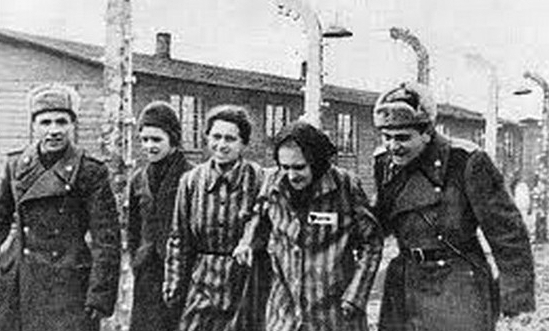
Soviet soldiers escorting two prisoners on the day of liberation, Auschwitz-Birkenau, Poland. (yadvashem.org)
If you ask the prisoners of Auschwitz or at least those who have ever visited the memorial and museum about what they felt -- they will tell you that the place where hundreds of thousands died is cursed. One gets the impression that the deathly silence of the cemetery is still broken by cries and moans of inmates pushed into gas chambers... piles of shoes of all sizes, tooth brushes, glasses... all these objects still appear to preserve the warmth of the hands of the people they belonged to.
***
Grzegorz Schetyna, Poland's Minister of Foreign Affairs,
suggested that
Ukrainian troops should be celebrated for liberating Hitler's death
camp, and
not the Soviet Red Army. ("Since the Ukrainian soldiers were there on
that
January day, it was they who opened the camp's gates," Schetyna said in
a
January 21 interview.) It's not the first and probably not the last
attempt to
distort the events related to the liberation of Auschwitz and the whole
history
of WWII. In April 2007, Poland closed the Russian exhibition in
Auschwitz
which had been located on the grounds of the former camp since 1961.
The
museum administration of the former Auschwitz concentration camp said
it
could be reopened only if Russia acknowledged the occupation of Poland
by
the USSR. The Polish side insisted that Western Ukraine and Belarus
were
Polish territories till 1939 and the inmates from these territories
were Polish
not Soviet.
Birkenau gate at Auschwitz
Poland also wanted the territories "annexed" by the USSR in accordance with the Soviet-German treaty of 1939 to be marked on the map at the exhibition's entrance.
Now they have started "to make precise" the information
on the pedigrees
and nationalities of the camp's liberators. Schetyna has been rebuffed
by the
users of social networks (a user under the nickname 20portal replied to
a
critical article in the Gazeta Wyborcza Polish newspaper,
writing,
"My stepfather survived Auschwitz. If he were alive he would strike
Schetyna
in the face"). But the Polish Minister stood his ground. Two days after
his
scandalous statement he went back to the subject ("I told the truth")
and said
that the first tank to crash the gate of Auschwitz-Birkenau was
commanded by
Ukrainian Igor Pobirchenko. The Minister did not care about the fact
that
Russians, Ukrainians and the people of many other nationalities fought
in the
ranks of the First Ukrainian Front. He just tried to explain publicly
why
Russian President Vladimir Putin was not invited to take part in the
ceremony
marking the 70th anniversary of the liberation of Auschwitz.

Perhaps Mr. Schetyna has no access to the information that in reality the camp's gate was broken down by Major Anatoliy Shapiro, a Jew -- the battalion he commanded was the first unit to enter Auschwitz. Even if it were not Shapiro, but Pobirchenko (an honored veteran who became a famous lawyer and an academician in the Soviet Union) -- what does it change in the history of the camp's liberation by the Red Army? Grzegorz Schetyna needs to be given a little lesson of history. The names of Soviet fronts changed to reflect the directions of advance. The front in question was called the First Ukrainian Front on October 16, 1943 to take part in the Kiev strategic offensive operation. Before that the First Ukrainian Front had the official name of the Voronezh Front prior to November 1943 and before that it was the Bryansk Front. The Red Army units had the servicemen of numerous nationalities within their ranks (with the exception of a few dozen of divisions manned by servicemen of certain nationalities (the 201st Latvian, the 16th Lithuanian etc.) as reinforcements were coming from all parts of the Soviet Union. The First Ukrainian Front was manned according to the same principle. According to the study prepared by a group of Soviet General Staff researchers headed by Colonel General G. Krivosheev, the Front included the servicemen of different nations: Russians -- over 66%, Ukrainians -- around 16%, Belarussians -- around 3%, Tatars -- around 2.2%, Jews -- over 1.6%, Kazakhs -- around 1.5%, Uzbeks -- 1.4%, others (a few dozen nationalities) -- at least 1%. Auschwitz was liberated on January 27, 1945 during the Red Army's Vistula-Oder Offensive by the 59th and 60th armies of the First Ukrainian Front operating in coordination with the 38th Army of the 4th Ukrainian Front.
Auschwitz was a network of Nazi concentration camps and
extermination
camps built and operated by fascist Germany. The 100th and 322nd
infantry
divisions of the 60th Army liberated Auschwitz III-Monovitz. At about 3
am
on the night of January 27, the 454th regiment of the Lviv 100th
infantry
division (under the command of Major General F. Krasavin) burst into
Auschwitz (the original camp). The very same day one more concentration
camp -- Jaworzno -- was liberated by the 286th infantry division (under
the
command of Major General M. Grishin) of the 59th Army. The next day the
107th infantry division (under the command of Colonel V. Petrenko)
liberated
Auschwitz-Birkenau. It's all crystal clear. The affirmations that the
Polish
Minister of Foreign Affairs lacked information sound unconvincing.
Making
fun of the Minister's ignorance Polish journalist Mariusz Novik made a
crib
sheet for Mr. Schetyna containing some historic information to allow
the
making of bold statements. It introduces him to the facts that the
servicemen
of many nationalities served in the ranks of the First Ukrainian Front.
Christopher Columbus did not hail from Colombia and American Indians
are
not from India. Mariusz Novik does not believe in the gross ignorance
of the
Minister. It's something else, something much more dangerous.

The attempts to destroy the memory of the liberation mission fulfilled by the Soviet Union and its Army during WWII have become so frequent that it starts to look like historic vandalism. Kiev does the same thing. "Ukrainians made up the majority of those who freed Auschwitz -- the Ukrainian Front," Valeriy Chaliy, deputy head of Ukrainian President Petro Poroshenko's administration, told a January 23 press briefing. The botched statement made by Ukrainian Prime Minister Arseniy Yatsenyuk about the Soviet Union's invasion of Germany and Ukraine is well known. In response, the German Ministry of Foreign Affairs cites diplomatic protocol refusing to comment on the ridiculous statements made by a top official of another state, no matter that he completely distorted the most important facts related to German history in the 20th century. Here is one more example: Latvia has declared its SS-legionaries to be "freedom-fighters" for a long time. It has cancelled a Holocaust exhibition in Paris devoted to the international day of holocaust victims. The display was organized by historians from Latvia, Russia and Belarus and was scheduled to open on January 25 under the title "Hijacked childhood. Victims of the Holocaust as seen by the child prisoners of Nazi concentration camp Salaspils" (which is southeast of the Latvian capital, Riga).
There are many more examples to prove an information-psychological war has been unleashed against Russia and Russians. The objective is "to revise" the results of WWII and show in a different light the contribution of the Soviet Union to the victory over Germany and the liberation of Europe.
We'd better listen to the victims of German concentration camps -- who are still alive and who greeted the Soviet liberators -- rather than pay attention to what neo-Nazi sponsors from Washington, Berlin and Kiev have to say on the occasion. Noah Flug, the late Chairman of the Center for Holocaust Survivor Organizations in Israel, has said that Jews remember that 65 years ago Majdanek and Auschwitz were liberated by Soviet soldiers and the Red Army. In ghettos and concentration camps, the Red Army was the people's last hope, it saved them, defeated Hitler, and saved Europe.
(Strategic Culture Foundation, January 27, 2015. Slightly edited for style by TML.)
In the News
January 25 Greek Elections
People's Rejection of Austerity Wins
Majority in the
Parliament
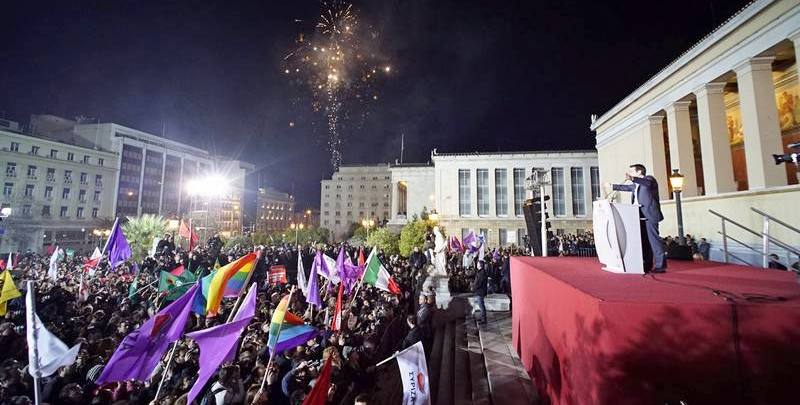
Alexis Tsipras, leader of Syriza which won the most seats in the January 25, 2015
general election, addresses victory rally in Athens on election night.
On January 25, Greece held a legislative election to elect all 300 members to the Hellenic Parliament in accordance with the constitution.[1] The key issue in the election was whether Greece should continue with the austerity agenda which has caused the people so much suffering.
Syriza, also known as the Coalition of the Radical Left, won its first legislative election, with 149 out of the 300 seats, two seats short of a majority. Alexis Tsipras, leader of the Syriza party was sworn in as Prime Minister of Greece on January 26, after Syriza reached a coalition agreement with ANEL (Independent Greeks), a party that shares its position opposing the austerity measures, although the two differ on other issues such as immigration and religion. The two parties cooperated while in opposition, blocking the election of a new president in December to trigger the general election.
The Greek people's resistance and refusal to submit to neo-liberal austerity will serve them in good stead in the ongoing fight against creditors' continued blackmail, threats and demands for austerity.
Tsipras said the new government would cooperate for "a fair and mutually beneficial solution" but said the Greek people come first. "Our priority from the very first day will be to deal with the big wounds left by the crisis," he said. "Our foremost priority is that our country and our people regain their lost dignity." He said his party would counter the EU and International Monetary Fund's bailout conditions "by making our own proposals for radical changes, including a four-year program of fiscal policy and a debt restructuring plan."
Syriza was far ahead in the polls going into the
election and expected to
win.[2] As preliminary voting
results began to appear on election day,
Syriza
leader Tsipras reaffirmed his support for Greece to remain part
of the
European Union while opposing austerity. "Today the Greek people will
write
history and the strong message of the Greek people will be that Greece
will
return to democracy. Greek people will regain social cohesion and
dignity.
And the message is that our common future in Europe is not the future
of
austerity. It is the future of democracy, solidarity and cooperation.
The time
has come for the Left!" he said.
Speaking to a rally of supporters in Athens on Sunday
night, Tsipras said,
"Greece leaves behind catastrophic austerity, it leaves behind fear
and
authoritarianism, it leaves behind five years of humiliation and
anguish."
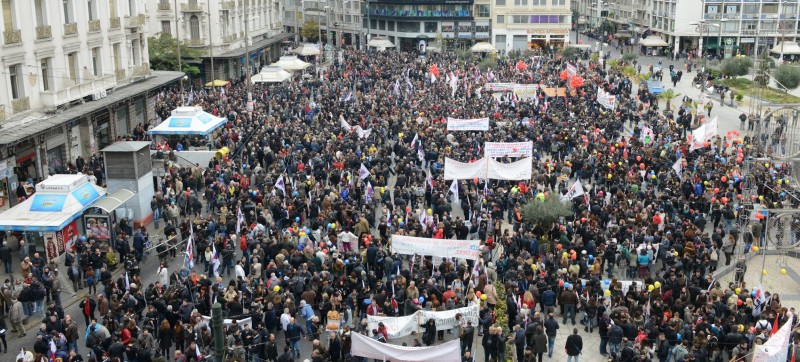
General strike against austerity, Athens, November 27, 2014.
Syriza campaigned under the slogan "Hope Is Coming" on a platform to renegotiate the debt that has been imposed on Greece by the European Union, the European Central Bank and the International Monetary Fund. The platform includes various measures to reverse the brutal cuts made in the last five years, such as raising the minimum wage and pensions which were severely cut, creating 300,000 jobs, rehiring more than 10,000 laid off civil servants, providing free electricity and meals for several hundred thousand impoverished households and free medical care for the uninsured.
Continued Demands from Creditors
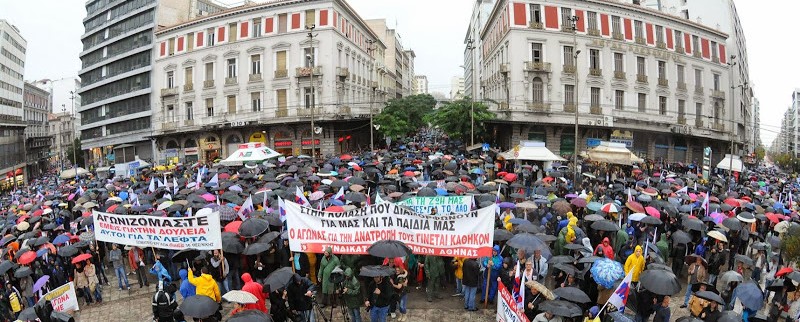
The representatives of the brutal financial interests that are robbing Greece blind made a pretence of agreeing to discuss new terms but in essence reiterated their threats, blackmail and demands. They made it clear they expect Greece to respect the terms of its 240 billion euro bailout deal on which a loan repayment of 17 billion is due in 2015.
"We believe Greece has accepted terms that are not off the table after the election day," said Steffen Seibert, spokesman for German Chancellor Angela Merkel on January 26. Meanwhile, German Finance Minister Wolfgang Schauble said, "There are rules, there are agreements."
The Eurozone chief of finance ministers Jeroen
Dijsselbloem said, "I don't
think there is a lot of support for [a restructuring] in the Eurozone."
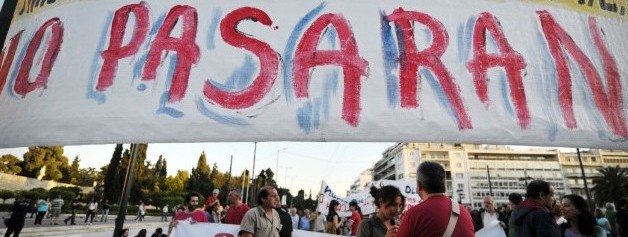
Mass demonstration against austerity, Athens, May 22, 2012.
UPI reports, "Creditors have offered an extension of the existing bailout program, and nothing more. The division between Tsipras and Greece's creditors is so large some see a Greek exit from the Euro within months, and the margin of victory by the Syriza party has some in Europe concerned it could empower leftist movements in other European countries, The Wall Street Journal speculated."
The creditors' demands violate the sovereignty of the Greek people to determine their affairs, including extricating themselves from a "bailout" program that has only further indebted and impoverished the people to make them pay for a crisis they did not create.
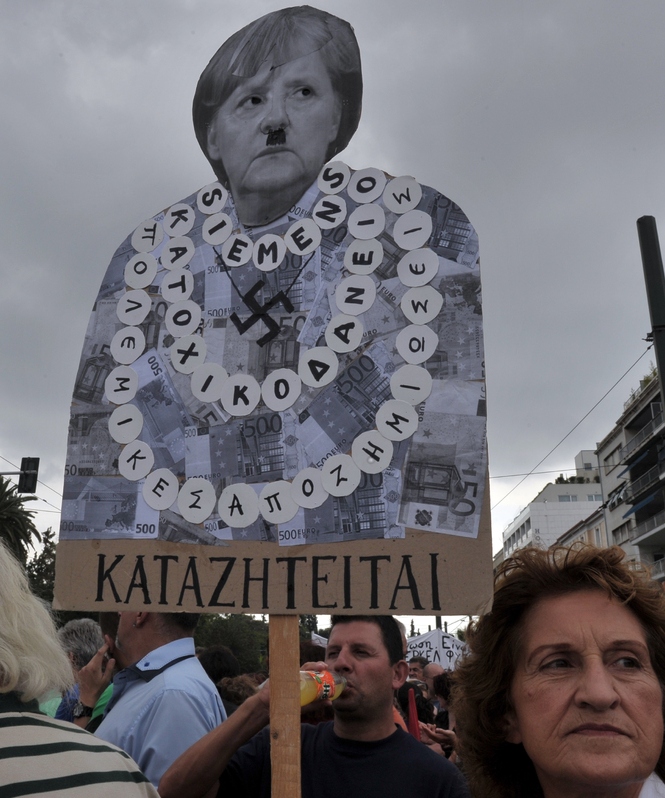 Germany's continued demands
are particularly arrogant and hypocritical. TML readers may
recall that when Chancellor Merkel
visited
Greece in 2012, she was met with shouts of "You are not welcome, Imperialisten
raus" (imperialists out) and "No to
the Fourth
Reich." Banners read "Merkel Out, Greece Is Not Your Colony" and "This
Is
Not a European Union, it's slavery." TML Daily wrote at
that
time, "The protests expressed the people's vehement rejection of the
brutal
austerity measures imposed on them, which Merkel is championing. They
also
pointed to the fact that Greece's current financial situation can be
traced to the
theft of Greece's gold by Germany during World War II. The gold has
never
been repaid and is still owed to the Greek people with interest. German
weekly Die Zeit has calculated the financial damage inflicted
on
Greece by Germany during the war to be 70 billion euros. The 1953
London
Agreement postponed the settlement of reparations to Greece until the
time
Germany would be reunited. However, a new treaty signed in 1990
excluded
the possibility of reparations."
Germany's continued demands
are particularly arrogant and hypocritical. TML readers may
recall that when Chancellor Merkel
visited
Greece in 2012, she was met with shouts of "You are not welcome, Imperialisten
raus" (imperialists out) and "No to
the Fourth
Reich." Banners read "Merkel Out, Greece Is Not Your Colony" and "This
Is
Not a European Union, it's slavery." TML Daily wrote at
that
time, "The protests expressed the people's vehement rejection of the
brutal
austerity measures imposed on them, which Merkel is championing. They
also
pointed to the fact that Greece's current financial situation can be
traced to the
theft of Greece's gold by Germany during World War II. The gold has
never
been repaid and is still owed to the Greek people with interest. German
weekly Die Zeit has calculated the financial damage inflicted
on
Greece by Germany during the war to be 70 billion euros. The 1953
London
Agreement postponed the settlement of reparations to Greece until the
time
Germany would be reunited. However, a new treaty signed in 1990
excluded
the possibility of reparations."
Consequences of Austerity
The terrible effects of austerity on the Greek people underscore the urgent need to end this subservience to the financial oligarchy. The consequences include a 40 per cent cut in public health spending, a poverty rate of 21 per cent, a child poverty rate of more than 40 per cent, an unemployment rate of 26.8 per cent, a youth unemployment rate of 50 per cent, a 20 per cent jump in stillbirths, the return of malaria after mosquito spraying programs were cut, and an increase in HIV as needle exchanges ran out of clean needles, amongst many other serious problems.
Even the tribune of the financial oligarchy the Financial Times is forced to admit the fraud and folly of a bailout program that was never intended to assist the Greek people. Martin Wolf, in a January 27 item for the Financial Times, points out that "the loans supplied by the eurozone and the International Monetary Fund amount to the huge sum of 226.7bn euros (about 125 per cent of GDP), which is roughly two-thirds of total public debt of 175 per cent of GDP. But this went overwhelmingly not to benefiting Greeks but to avoiding the writedown of bad loans to the Greek government and Greek banks. Just 11 per cent of the loans directly financed government activities. Another 16 per cent went on interest payments. The rest went on capital operations of various kinds: the money came in and then flowed out again."
Thinkprogress writes, "While the European
Union, led by
Germany, has enforced austerity in the name of promoting economic
stability,
evidence shows cutting spending in the midst of economic crisis has
made the
slump longer and more painful. The Greek economy has only barely begun
growing again, largely due to the easing of austerity over time."
Note
1. The election was held following
the failure of the
Greek parliament to elect a President of State by the end of December
last year. The single candidate, Stravos Dimas, put forward by the
previous pro-austerity government led by the neo-liberal New Democracy
party, was rejected by a majority of members of parliament, resulting
in the dissolution of parliament and the calling of the snap election.
The previous government was elected in the May
2012
general elections for a four-year term.
2. In the election the New Democracy Party, one of the main parties in the previous coalition government that collaborated with foreign creditors to impose austerity, was reduced from 129 seats to an all-time low of 76 seats. Social-democratic PASOK, a coalition partner of New Democracy, went from 33 to 13 seats. New political party To Potami entered parliament with 17 seats. Below are the full results:
|
Party |
Seats |
Seat Change |
Number of Votes |
Percentage of Votes Cast |
Swing (%) |
|
Syriza |
149 |
+78 |
2,246,064 |
36.3 |
+9.4 |
|
New Democracy |
76 |
-53 |
1,718,815 |
27.8 |
-1.9 |
|
Golden Dawn |
17 |
-1 |
388.447 |
6.3 |
-0.6 |
|
To Potami |
17 |
+17 |
373,868 |
6.1 |
(new party) |
|
Communist Party of Greece |
15 |
+3 |
338,138 |
5.5 |
+1.0 |
|
ANEL |
13 |
-7 |
293, 371 |
4.8 |
-2.7 |
|
PASOK |
13 |
-20 |
289, 482 |
4.7 |
-7.6 |
Voter turnout was reported to be 63.9 per cent of the 9,808,760 eligible voters.
(With files from TeleSUR, Wikipedia, RT, Thinkprogress, Reuters, France24, Financial Times, TML Daily)
The Stand that There Is an Alternative to Austerity
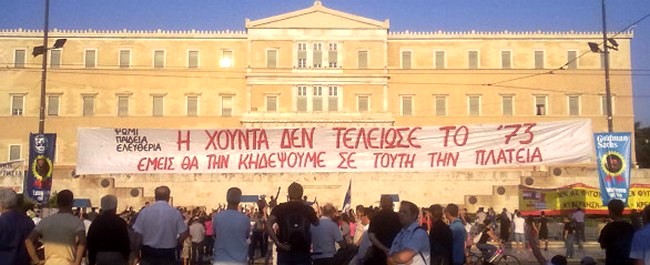
Anti-austerity action in Syntagma Square, in front of the Greek Parliament, June 18, 2011.
Banner reads: "The junta did not end in '73. We will bury them here in the square."
Writing about the results of the Greek election, the newspaper Workers' Weekly, published by the Revolutionary Communist Party of Britain (Marxist-Leninist), points out amongst other things:
"The results as a whole reveal that Greeks have firmly rejected the status quo and the forces overtly favoured by the European establishment. The old forces have been unable to resolve things and perpetuate the status quo, and the old political cartel has collapsed, as reflected in the greatly-reduced vote for the previously-ruling New Democracy and the derisory 13 seats achieved by the old party of the official left, PASOK.
"One consequence has been the formation or rise of smaller parties. For example, the new party The River [To Potami], which formed in February last year, won third place in parliament. The results could therefore be said to reflect a political system in flux, where the old party-model does not currently apply and what will replace that has yet to be consolidated.
"The election was surrounded by disinformation from the Greek and international media and overt intervention by the EU establishment. This campaign has sought to discredit and misrepresent Syriza and spread fear with the aim of disorienting people from taking the initiative.
"One key feature of this disinformation concerns the characterisation of Syriza as 'extreme left.' The idea here is that there is no alternative to austerity. To propose any alternative, and to merely suggest that the needs of the population should take more of a priority in relation to other claims on the Greek economy, are radical suggestions that are labelled 'extreme.' To pursue such extreme policies will lead to chaos, and so voters should fear the rise of this maverick party, runs this argument.
"The decisiveness of the election result therefore represents a stand that has been developing in the face of such scaremongering and disinformation. It represents the stand that there is an alternative to austerity.
"Greece is experiencing austerity at its sharpest, and the growing sentiment is that enough is enough. There is a developing consciousness of the alternative as a matter of necessity and that the resistance to austerity cannot confine itself to remaining reactive. The need has arisen to create conditions where people can start to elaborate their own solutions and develop their independent politics and have the space to grow in strength so they can bring their weight to bear, and so that it is more difficult for the pro-austerity forces to impose themselves and to continue in the old way.
"The vote is a reflection of a growing sense of the need for strategy and tactics in this regard, a developing of the political level of the population. The election was a very practical political battle, which had to be resolved in favour of people being able to unite in action aimed at ending austerity.
"The election of Syriza by such a large margin despite the fear-mongering and disinformation is therefore a significant result. Syriza's platform is not in itself revolutionary. Yet, to carry it through is a block to the austerity agenda and of importance to all in Europe."
(Workers' Weekly, January 31, 2015)
World Economic Forum in Davos, Switzerland
Private Monopoly Interests Have Captured
the Public Authority
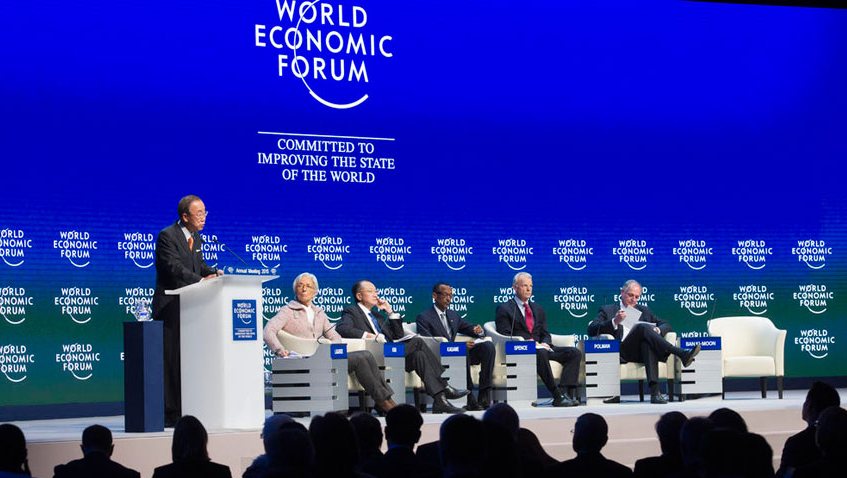
Davos, January 23, 2015.
Comment on the World Economic Forum and Its Politics
The World Economic Forum (WEF) has become a foremost ideological and political proponent of imperialist globalization and the control of public institutions by private monopoly interests. With 500 employees mainly in Europe and the U.S., and mountains of cash from its wealthy patrons, the WEF engages in constant ideological and political work for its imperialist agenda.
The WEF views control over the public authority by private interests as the means by which specific monopolies can sustain and grow their accumulated social wealth. This aim is summed up in its doctrine: "The WEF is an International Institution committed to improving the state of the world through public-private cooperation. [It] engages political, business, academic and other leaders of society in collaborative efforts to shape global, regional and industry agendas."
The material on the WEF website consistently pushes its doctrine advocating practical politics in favour of the private monopoly interests of its membership. To this end, the material and politics are pragmatic and open to whatever works or is necessary within the conditions the owners of social wealth face. In order to succeed, it argues, accumulated social wealth organized within the structure of the most dominant private monopolies must exercise control over the public authority or state in all its forms and institutions.
Private monopoly control of the state and its public institutions translates into dictatorship over the people and economy. This guarantees the most dominant monopolies, which control the state, the power and freedom they need to defend and enlarge their social wealth through the exploitation of the working class, the social instruments of production and the natural resources found at home and abroad. Of course, this also guarantees constant tension and struggle amongst the monopolies competing both within the economy and for control of the state, which can erupt at any time into open civil warfare. At this time, the fight for control of the state amongst competing monopolies and individual owners of social wealth is most pronounced in the United States.
 Canada is a member within
the WEF recognized imperialist system of
states. The public funds and institutions of the Canadian state are
mobilized
in favour of the privileged monopolies. All state institutions have
become or
are becoming public-private partnerships dedicated to enlarging the
social
wealth of certain privileged monopolies. Official politics is reduced
to
defending the private interests of the monopolies that control the
state. The
society, people and resources are geared to guarantee the success of
the
privileged monopolies in their exploitation of the working class at
home and
abroad, and in their competition with other monopolies within the
imperialist
system of states.
Canada is a member within
the WEF recognized imperialist system of
states. The public funds and institutions of the Canadian state are
mobilized
in favour of the privileged monopolies. All state institutions have
become or
are becoming public-private partnerships dedicated to enlarging the
social
wealth of certain privileged monopolies. Official politics is reduced
to
defending the private interests of the monopolies that control the
state. The
society, people and resources are geared to guarantee the success of
the
privileged monopolies in their exploitation of the working class at
home and
abroad, and in their competition with other monopolies within the
imperialist
system of states.
Any opposition to the monopoly-controlled politics is deemed illegitimate and denigrated both at home and abroad. Internally this is expressed in increasingly repressive legislation and police powers to suppress the right to conscience and the right to resist exploitation. In the incessant march around the world to extend imperialist globalization and defeat their competitors, the monopolies and their state come into conflict both with people who do not want to be oppressed and exploited, and with other states controlled by private monopoly interests who are competing for the same target. The Harper government is now embroiled in an active war in Iraq to gain absolute control of the region on behalf of the private monopolies that control the U.S. and Canadian states.
On the international scene, the WEF rarely mentions countries. It recognizes only economies, industries, companies and regions. The politics of countries that may defend their own interests in opposition to imperialist globalization or in competition with the monopolies of Canada and the U.S. are labelled as illegitimate and actively "illegitimatized." The "illegitimatized" states become a target for regime change such as Syria, Cuba, the DPRK, Venezuela and Russia.
The WEF never mentions social classes as this runs counter to the private interests of its monopoly patrons. The WEF has eliminated the reality of social classes and class struggle from its lexicon if not from its practical politics. The way people acquire their living as the manner to determine their social class is replaced with the notion of inequality of social wealth or one's position on a scale of earnings. For the WEF, inequality of social wealth or earnings exists outside any social condition of classes and class oppression, exploitation and resistance. Problems of inequality are for the owners of social wealth to resolve, mainly through charity, but also through social programs that prove lucrative to particular monopolies.
 Regarding problems in the
imperialist economy, the WEF is pragmatic and
not hidebound within its worldview. For example, it promotes both
austerity
and anti-austerity as long as the aim of the measures serves the
private
interests of the privileged owners of social wealth who are in control.
On its
website and in forums, representatives of the World Bank and IMF
promote
strict adherence to neo-liberal austerity orthodoxy side by side those
such as
U.S. politician Larry Summers who writes, "deflation and secular
stagnation
are the risks of our time" and calls for economic stimulus,
Quantitative Easing
(injection of state money into the economy in excess of its growth),
and
infrastructure spending. The WEF applauds and encourages whatever works
to serve the aim of the privileged elite, who have seized control of
the
economy and state, to defend and enlarge their social wealth.
Regarding problems in the
imperialist economy, the WEF is pragmatic and
not hidebound within its worldview. For example, it promotes both
austerity
and anti-austerity as long as the aim of the measures serves the
private
interests of the privileged owners of social wealth who are in control.
On its
website and in forums, representatives of the World Bank and IMF
promote
strict adherence to neo-liberal austerity orthodoxy side by side those
such as
U.S. politician Larry Summers who writes, "deflation and secular
stagnation
are the risks of our time" and calls for economic stimulus,
Quantitative Easing
(injection of state money into the economy in excess of its growth),
and
infrastructure spending. The WEF applauds and encourages whatever works
to serve the aim of the privileged elite, who have seized control of
the
economy and state, to defend and enlarge their social wealth.
Certain WEF articles call for an end to all restrictions of monopoly right so that owners of social wealth and their monopolies can more easily increase their holdings without consideration of the social and natural consequences. Other articles declare that particular state measures are necessary, for example, to restrict CO2 emissions so that privately owned green monopolies can expand and prosper. Former U.S. Vice-President and now green billionaire Al Gore, Chairman and Co-Founder of Generation Investment Management always seems to be present at WEF events or contributing to its activities. Gore along with Pharrell Williams, Creative Director and Brand Ambassador, Bionic Yarn, are organizing a series of Live Earth concerts to promote their businesses, and the WEF appears to be an active partner.
The WEF and its privileged collective of owners of social wealth attempt to consolidate their ideological grip over the people and society by eliminating the working class as the essential human factor in the modern economy, of course not in practice but in ideology. The dynamic social forces in the economy are presented as companies and consumers thus erasing the working class as the actual producers with independent thinking, ideology and politics. The WEF sees, "The alliance of companies and consumer as a driving force for change in society."
As consumers, the working class engages with companies as equals in the marketplace. The companies have a service or goods to sell and workers have money to spend. Both engage in simple exchanges of goods and services and both expect full value in the exchange. To promote this relationship as "a driving force for change" eliminates the basic contradiction in the modern economy between the social nature of mass production and its private ownership and control. It also erases from social consciousness the working class, as the only organized factor capable of moving society forward to harmonize the relations amongst individuals, between individuals and collectives, and between individuals and collectives with society. In this regard, the WEF avoids speaking of the relation of the working class with owners of social wealth in the workplace. This relation of production is profoundly unequal, unstable and overripe for revolutionary change.
The WEF boils down its views into one-nation politics where contending social classes and strata give up their independent views, interests and politics, and bow down and submit to the rule of the dominant monopolies that control the state. The actual producers, the modern working class, are deprived of their right to affirm their leadership of society and to own and control the socialized means of production and the distribution of the economy's goods and services, which workers produce using the instruments of production they previously produced.
The contradiction between the social forces of production and their private ownership and control is at the root of all the intractable problems in the economy, which remain unresolved, and the cause of the recurring economic crises, growing inequality, the constant predatory and inter-imperialist wars, and the destructive and arbitrary nature of class privilege.
The most dominant monopolies have extended their power and class privilege to direct control of the public institutions of the state. In this situation, the state represents and defends the narrow private interests of certain owners of social wealth in contradiction with all other members of society. The state has become the tool of not just the class of owners of social wealth but a privileged elite within that social class. This can only lead to deepening insecurity, anarchy and violence both within the society and in its relations with other peoples of the world. A new direction for the politics and economy of Canada is necessary that challenges the control of the state and its public institutions by a small privileged ruling elite of owners of social wealth and their representatives.
Information
The World Economic Forum (WEF) held its annual meeting January 21-24, 2015, in Davos-Klosters, Switzerland. The WEF says, "Members comprise 1,000 of the world's top corporations, global enterprises usually with more than US$5-billion in turnover. These enterprises rank among the top companies within their industry and play a leading role in shaping the future of their industry and region.... The Strategic Partners community comprises a select group of 100 leading global companies representing diverse regions and industries selected for their alignment with the Forum's commitment to improving the state of the world."[1]
What is the World Economic Forum
The WEF website states, "The WEF is an International Institution committed to improving the state of the world through public-private cooperation. [It] engages political, business, academic and other leaders of society in collaborative efforts to shape global, regional and industry agendas."
In addition to the annual Davos gathering, the WEF organizes regional meetings throughout the year. The upcoming meetings are: the WEF on East Asia, to be held in April in Indonesia; the WEF on Latin American in early May in Mexico; the WEF on the Middle East and North Africa in late May; and the WEF on Africa in June in South Africa.
These meetings bring together the leaders of the global monopolies and their political representatives from various countries and international institutions such as the United Nations.
World Economic Forum Projects
WEF-funded projects are numerous and diverse. The following is a small sample of its direct engagement in the economy and politics:
"A New Vision for Arab Employment -- In the face of the world's highest youth unemployment rate, the New Vision for Arab Employment initiative provides a neutral discussion platform, gathering top-level leaders from government,..."
"Accelerating Capital Markets Development in Emerging Economies -- Capital markets boost economic development by channelling the wealth of savers into productive investments. This project will explore how emerging countries can more efficiently develop their capital markets..."
"Chinese Globalizers Innovation -- This phase of the project will identify one or more key challenges that face rapidly globalizing Chinese companies..."
"Emerging Best Practices of Brazilian Globalisers -- As Brazilian corporations expand into global markets, be it in Latin America, Africa or Asia, and competition shifts from a regional to global level, corporate citizenship strengthens their competitive advantage, allowing them to grow sustainably while also serving stakeholders..."
The following gives a broader look at one WEF project and its focus on serving the private interests of certain global monopolies.
"Engaging Tomorrow's Consumer
"Over 2012-2014, the World Economic Forum and its partner companies collaborated to define, incubate and launch two initiatives related to engaging consumers in sustainable consumption:
"- A new marketing award with Effie Worldwide Inc., 'Positive Change', which rewards marketers for engaging consumers through sustainability-focused marketing programs
"- A new global media platform, 'Collectively,' launched collaboratively by multiple companies designed to inspire and empower the millennial generation to make sustainable living the new norm
"Collectively and the Positive Change Effie Award will pave the way for companies to begin embedding sustainability in their brands and engaging consumers in more sustainable lifestyles. While launching these two initiatives, the project team is also scoping the next phase of the project.
"Objectives
"Partner companies identify that challenges continue to exist to engage consumers in not only sustainability, but other broad societal issues. Business leaders believe that consumers are critical actors to drive change in Environmental, Social and Governance (ESG) issues relevant to different industries in collaboration with companies and other stakeholders.
"The objective of the project is to engage millennials through public-private partnerships and open innovation to drive progress on Environmental, Social and Governance (ESG) challenges. One idea to enable this strategy is through crowdsourcing and hackathons.
"The World Economic Forum's Partner companies serve billions of consumers daily. Through a true collaboration between companies and consumers, the intersection of corporate agenda around addressing ESG challenges and consumer engagement around being a part of the solution can be addressed."
"Key Organizations" listed on the site are "Accenture, Best Buy Co., BT, Carlsberg Group, Coca-Cola Company, Effie Wordwide, Henkel, Kingfisher, Lenovo, Marks & Spencer, Omnicom Group, PwC, VICE MEDIA Inc., WPP."
Under "Related reports " is: "Engaging Tomorrow's Consumer Project Report 2014 -- At the World Economic Forum Annual Meeting 2012 in Davos-Klosters, business leaders provided the direction that, to achieve sustainable consumption, business must engage consumers by redesigning products and services, reshaping demand, and leveraging innovative communications to drive transparency and engagement."
As reported on its website, the agenda and events of the 2015 WEF Davos gathering were the following:
The Key Moments from Davos 2015
- Fon Mathuros*, January
24,
2015 (Excerpts) -
The World Economic Forum Annual Meeting ended today with a Co-Chairs debate on the Global Agenda 2015. The session closed a week-long meeting on the world's most pressing issues and long-term challenges, including inequality, climate change and terrorism.
"To reduce inequality, the best answer is growth," Roberto Egydio Setubal, Chief Executive Officer and Vice-Chairman of the Board of Directors, Itaú Unibanco, Brazil; Co-Chair of the World Economic Forum Annual Meeting 2015, said. [...]
Jim Yong Kim, President, The World Bank, Washington DC; Co-Chair of the World Economic Forum Annual Meeting 2015, said: "We have to increase the impact that global growth has on the poorest." [...]
Katherine Garrett-Cox, Chief Executive Officer, Alliance Trust, United Kingdom; Co-Chair of the World Economic Forum Annual Meeting 2015, said this year is going to be the ultimate test "to see if public-private partnerships really work." [...]
Winnie Byanyima, Executive Director, Oxfam International, United Kingdom; Co-Chair of the World Economic Forum Annual Meeting 2015, said: "Growth must touch everybody and lift everybody if it is to be sustainable." She said that at the meeting she had met many business leaders ready to commit to reducing inequality and to mitigating the impact of climate change but that political leaders are falling behind.
Robin Niblett, Director, Chatham House, United Kingdom, said: "Governments are being delegitimized in many parts of the world. They are struggling to keep up." However, he also sees promising signs for 2015, including the European Central Bank's adoption of quantitative easing and the boom in alternative energies, which low oil prices will not stop.
Li Keqiang, Premier of the People's Republic of China, was the first to tackle the inequality issue head on. "We need to ensure a relatively high employment rate, especially sufficient employment for young people. And we need to optimize income distribution and raise people's welfare," he said, outlining the "new normal" growth in China.
Climate change was top of the agenda, following an invitation by the French government to galvanize public-private support for the 2015 UN climate change conference in Paris later this year. Al Gore, Chairman and Co-Founder, Generation Investment Management, and Pharrell Williams, Creative Director and Brand Ambassador, Bionic Yarn, answered the call immediately, announcing their Live Earth series of concerts. "We are literally going to unite humanity all at once," Williams said.
Ban Ki-moon, UN Secretary-General; Christine Lagarde, Managing Director, International Monetary Fund (IMF), and Jim Yong Kim, President, The World Bank, also supported the plea. "It's a collective endeavour, it's a collective accountability and it may not be too late," Lagarde said.
Matteo Renzi, Prime Minister of Italy, talked about how to reignite Europe's growth engine. "The European direction must stress the importance of growth and public and private investment, not only austerity," he said.
Angela Merkel, Federal Chancellor of Germany, said on Thursday [January 22] that "so-called austerity is often pitted against so-called growth" and that "we need a growth-oriented, sound fiscal policy, we need investments by the state, and we need an environment which encourages private investors to take out investments."
As the European Central Bank prepared to announce its quantitative easing programme, Lawrence Summers, Charles W. Eliot University Professor, Harvard University, said that "deflation and secular stagnation are the risks of our time", while Gary Cohn, President and Chief Operating Officer, Goldman Sachs, told participants the world is in a "currency war." He said: "One of the easier ways to stimulate your economy is to weaken your currency."
On Friday [January 23], François Hollande, President of France, put terrorism on the agenda. "There cannot be prosperity without security," he said. He urged the private sector to play a role as there needs to be a global international response. "It needs to be international and it needs to be shared, also by business, particularly the largest corporations," he said. John Kerry, US Secretary of State, said: "Eliminating the terrorists that confront us today actually only solves part of the problem. We have to do more to avoid an endless cycle of violent extremism. We have to transform the very environment from which these forces emerge."
Technology stakeholders discussed the future of the internet. Satya Nadella, Chief Executive Officer, Microsoft, focused on internet security and transparency. "We've got to get this balance between privacy and legitimate public safety. The internet is one of the greatest global goods. If we destroy it, we destroy a lot of our economic future." Sheryl Sandberg, Chief Operating Officer, Facebook, said that increasing access should be key. "If we can extend the internet to more people, we increase economic opportunities and equality," she said.
The Forum gained formal status under the Swiss Host State Act, confirming its role as an international institution for public-private cooperation.... Simonetta Sommaruga, President of the Swiss Confederation, and her entire cabinet, were in Davos for the meeting.
The meeting created momentum for the Forum's regional agendas, thanks to strong representation from governments and business leaders from emerging markets, including Mexico, Indonesia, Nigeria, Turkey and South Africa, in addition to those from Brazil, Russia, India and China.
- African leaders, including Alpha Condé, President of Guinea, and Jacob Zuma, President of South Africa, gathered to discuss the Forum's Africa Strategic Infrastructure Initiative.
- Mexican stakeholders worked to advance and sustain the country's long-term growth reforms.
- The cabinets of Brazil, Russia and India were all represented by senior ministers, including Joaquim Levy, Minister of Finance of Brazil; Igor Shuvalov, First Deputy Prime Minister of the Russian Federation; and Arun Jaitley, Minister of Finance of India.
A number of key stakeholders from Libya, Syria and Ukraine gathered for informal talks. Topics included the mitigation of the impact of the Syrian conflict on its population and the reversal of the emergency situation in Libya. This was part of the Forum's long-standing commitment to improve the state of the world, which also includes ongoing engagement on Palestinian-Israeli relations.
Against the background of ongoing conflict, the Forum also convened an expanded meeting of business leaders from Ukraine, the Russian Federation, Europe and the United States as part of its ongoing Geneva-Ukraine Initiative....
The Shaping Davos initiative brought together Global Shapers from around the world. Over the course of 16 live sessions, 40 cities connected to the meeting in Davos. These included Gaza, Juba, Erbil, Paramaribo and San Salvador. The spirit of Davos was present in all these cities as Global Shapers hosted local conversations on the meeting's topics.
The Forum launched a new Global Challenge Initiative on
Food Security
and Agriculture, with support from the Government of Canada and a broad
network of stakeholders....
*Fon Mathuros is
Senior Director, Head of Media,at the World Economic Forum.
TML
Note
1. For a list of the member companies called "active industry partners" click here. For the leading group, called Strategic Partners, click here.
(All quotations and extracts from http://www.weforum.org/)
Third Summit of Community of Latin American and Caribbean States
Decisions and Interventions
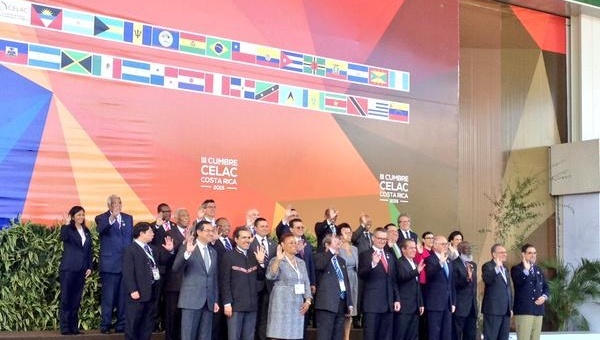
CELAC Summit in San José, Costa Rica, January 28, 2015.
The Third Summit of the Community of Latin American and Caribbean States (CELAC) was held in San José, the capital of Costa Rica, in an environment which favoured unity and regional integration, Prensa Latina reports.
CELAC brings together 33 Latin American and Caribbean nations -- all the countries of the Americas except the U.S. and Canada -- and represents around 600 million people. It was launched in 2010 at the Rio Group Unity Summit in Mexico and officially launched with the signing of the Declaration of Caracas on December 3, 2011, in Venezuela.
The meeting was inaugurated in the presence of 21 heads of state and government and other representatives of CELAC member countries.
During more than 10 hours of proceedings, twenty leaders presented the positions of their governments on the cardinal issues in the region, including the need to face new challenges together, Prensa Latina writes.
The President of Costa Rica Luis Guillermo Solis said that diversity in thought and unity in action must be the greatest strength and reference point to guide the Community.
Advances to this end were identified by President of Cuba Raúl Castro, who stressed that "Our America has entered a new era and has advanced since the creation of the Community of Latin American and Caribbean States."
To develop unity in diversity, cohesive performance and respect for differences will remain our primary purpose and an unavoidable necessity, because the world's problems are being compounded, he said.
Heads of state and government were unanimous in their demand to end the more than half-century U.S. blockade of Cuba.
The leaders also welcomed the decision of Cuban President Raúl Castro and U.S. President Barack Obama to restore diplomatic relations between the two countries, broken by the U.S. in 1961.
Support for the peace process in Colombia and the decision to move forward in the fight against poverty and social inequalities were other common points raised.
The Summit concluded by adopting a political declaration, statements on various subjects and an action plan for 2015.
At the CELAC Meeting
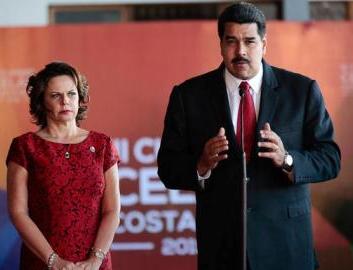 Venezuelan President Nicolas Maduro |
Venezuelan President Nicolas Maduro said that Latin America is living in a "new historic era" marked by unity and great opportunity. President Maduro also predicted that the 21st century will "mark the end of imperialism."
He called on his colleagues to continue the efforts at strengthening regional integration: "I call for the [necessary] political will, for respect and the needed diversity to continue down the path of the building of a new Latin America and Caribbean. From Venezuela we will continue to make our small contribution with volition, love, and patience."
He also backed Nicaragua's intervention in favour of Puerto Rican independence and reiterated his call for the blockade against Cuba to be lifted.
President Maduro denounced the visit of the former presidents of Chile, Colombia and Mexico to Venezuela to participate in a forum organized by the right-wing opposition. "This is not tolerable in the current political life of Latin America and the Caribbean," he said. He asked if any other head of state in the region would tolerate an opposition that seeks to remove it through coups and other undemocratic means.
Maduro's speech was followed by Bolivian President Evo Morales, who also centred his comments on the progress the region has made in the face of North American imperialism.
"This integration has come nearly 200 years after the founding of the republic, 200 years under various empires," said President Morales, adding that he hoped for "a definitive liberation for our peoples."
Later President Morales highlighted the importance of social movements in the region during a press conference following his meeting with various representatives from these movements. He praised their determination and resolve, which he said have helped achieve a deep political transformation process throughout the region.
"Capitalism and neo-liberalism inflict harm on humanity and nature. It has proven to be a failed model which doesn't benefit the people," said Morales in a speech that highlighted the need to construct a new global economic model.
He added that the state must play an important role in
the economy both
in terms of regulation and ownership of domestic production.
Morales attributed Bolivia's economic success largely to his government's decision to greatly increase its control over the country's natural resources. This has led to increased government revenues allowing them to eliminate their economic dependence on international financial institutions and foreign development assistance agencies.
Morales emphasized the importance of being independent from international financial institutions like the IMF and World Bank, noting that the IMF no longer has its offices set up in the Bolivian Central Bank. "In order to have economic freedom you must have political freedom," he said.
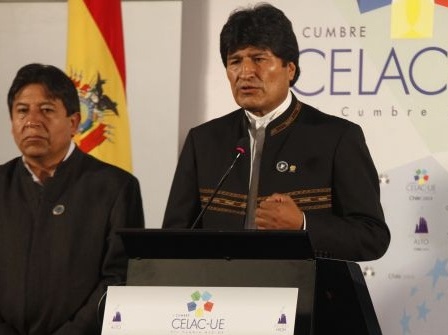 Bolivian President Evo Morales |
As part of Bolivia's efforts to achieve political sovereignty, Morales stressed the importance of decreasing its dependence on the United States, stating that previously the country had allowed the U.S. to exercise geo-political control through the so-called war on drugs. "Today we show them how to fight against narco-trafficking with the participation of the people," he said.
As a result of President Morales' decision to expel U.S. Ambassador Phillip Goldberg in 2008 for "conspiring against democracy and seeking the division of Bolivia," as well as the expulsion of the U.S. Drug Enforcement Agency and USAID in 2013 on a similar basis, U.S. assistance to Bolivia fell from U.S.$99.7 million in 2008 to U.S.$5.2 million in 2013, and to zero in fiscal year 2014.
In another development at the Summit, Ruben Berrios
Martinez,
President of the Puerto
Rican Independence Party, called on CELAC to help Puerto Rico, a U.S.
territory, regain
its
independence. Puerto Rico was
given to the U.S. in 1898 following the Spanish-American War. Puerto
Ricans
have fought long and hard for their independence first from Spain and
now the U.S.
"The persistence of colonialism in my motherland Puerto Rico constitutes an affront to the dignity of Our America," said Berrios Martinez. "Colonialism is a violation to the most elemental human rights. The inalienable right to free determination and independence is an absolute rule of international law."
Berrios Martinez asked CELAC to introduce a plan to make the UN General Assembly take a stand on the case of Puerto Rico and also to demand that the U.S. government liberate Puerto Rican independence activist Oscar López Rivera, "the longest serving political prisoner in the world having been in prison nearly 34 years." López Rivera recently turned 70 years old. He was convicted in 1981 of seditious conspiracy due to his participation in the Puerto Rican independence movement and sentenced to 55 years in prison.
In his petition to CELAC, Berrios Martinez pointed to the new relationship between the U.S. and Cuba saying it means that "it would be inconceivable to maintain Puerto Rico's colonial status."
Ecuador assumed the pro-tempore presidency of CELAC at the Summit, taking over from Costa Rica. Ecuadorian President Rafael Correa set out the radical steps CELAC will take in 2015. "We have to advance and develop much faster," he said, before detailing five key areas of work.
First, Correa reiterated his commitment to eradicating poverty and inequality. Second, the CELAC will target education, "the most important step toward development." He noted that at present, Latin America has none of the world's top universities, but aims to have 12 in the future. The third priority is science, technology and innovation and the fourth the environment. "We must raise our voices against the catastrophe of climate change," Correa told CELAC delegates. The fifth key area is to provide funding for infrastructure, for which investments increased 6.2 per cent last year.
Correa criticized predatory investment funds, such as the ones that threatened the economy and sovereignty of Argentina. He suggested that in future, the BRICS countries -- Brazil, Russia, India, China and South Africa -- could provide alternative means of financing, and that CELAC could and should provide the impetus for a new financial order.
The Ecuadorean president confirmed the CELAC's "rejection of the aggression and economic war against Venezuela," and offered its support to Colombia "in its search for peace."
(With files from Prensa Latina, TeleSUR. Photos: Venezuelan Presidency, AVN.)
The Solidarity of Our America Will Be Decisive
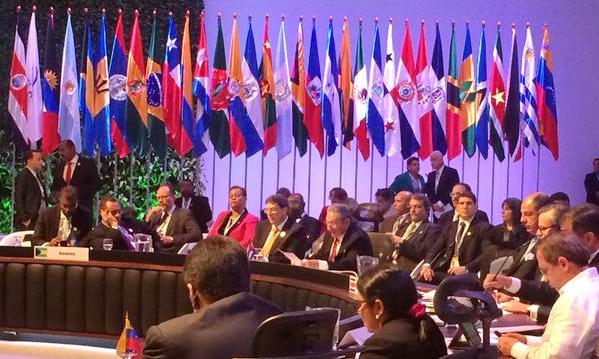
Speech by Army General Raúl Castro Ruz, First Secretary of the Central Committee of the Communist Party of Cuba and President of the Councils of State and Ministers, at the Third CELAC Summit, held in Costa Rica, on January 28, 2015, "Year 57 of the Revolution."
(Council of State Transcript)
Esteemed President Luis Guillermo Solís; Esteemed Heads of State and Government of Latin America and the Caribbean; Esteemed Heads of the Delegations and guests accompanying us:
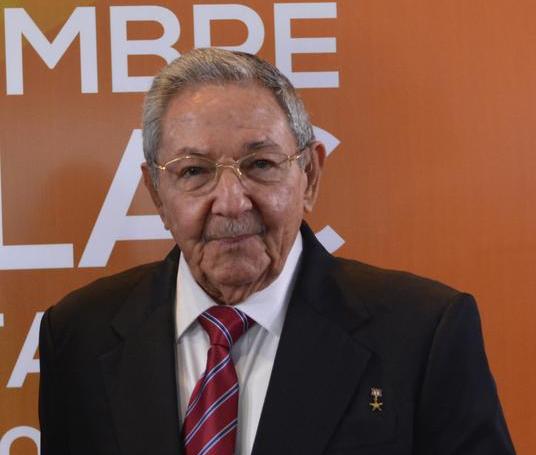 Cuban President Raúl Castro Ruz |
Our America has entered a new era and has advanced, since the creation of the Community of Latin American and Caribbean States, in its goals of independence, sovereignty over its natural resources, integration, the construction of a new world order, social justice and democracy of the people, by the people and for the people.
Today there is a commitment to justice and the rights of the peoples which is superior to that in any other historical period. Together, we are the third largest economy in the world, the area with the second largest oil reserves, the greatest biodiversity on the planet and a high concentration of the globe's mineral resources.
To develop unity within diversity, cohesive action, and respect for differences will remain our primary purpose and an inescapable necessity, because the world's problems are serious, and great dangers and tough challenges persist which transcend national and even sub-regional possibilities. Over the past decade, economic and social policies and sustained growth have allowed us to confront the global economic crisis and made possible a reduction in poverty, unemployment and unequal income distribution.
The profound political and social transformations carried out in several countries in the region have brought dignity to millions of families who have escaped poverty. But the Latin American and Caribbean region remains the most unequal on the planet. On average, 20% of households with the lowest incomes receive 5% of total income; 167 million people still suffer from poverty, one in five children under 15 live in poverty, and the number of illiterates exceeds 35 million. Half of our youth do not have secondary education or a ninth grade education, but, in the lower income sector, 78% do not complete their studies. Two-thirds of the new generation do not reach university.
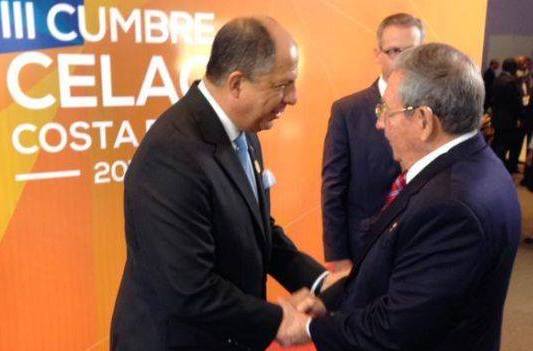 Costa Rican President Luis Guillermo Solís greets President Castro. |
The number of victims of organized crime and violence, which threatens the stability and progress of nations, is increasing. What would be the thoughts of the tens of millions of marginalized on democracy and human rights? What would their opinion be regarding political models? What would they argue about election laws? Is this the civil society which governments and international organizations take into account? What would they say if they were consulted on economic and monetary policies?
Little do many of the industrialized States have to show our region in this respect, where half of youth are unemployed, the crisis is heaped onto the workers, and students are repressed while the bankers are protected, unionization is prevented, lower wages are paid to women for equal work, inhumane policies are applied against immigrants, racism, xenophobia, violent extremism and neo-fascist tendencies are on the rise, and where citizens do not vote because they see no alternative to political corruption, or they know that election promises are soon forgotten.
To achieve social inclusion and environmental sustainability, we are obliged to create our own vision regarding economic systems, patterns of production and consumption, the relationship between economic growth and development, and also, the effectiveness of political models.
We must overcome the structural gaps, ensure high quality free education, free universal health coverage, social security for all, equal opportunities, the full exercise of all human rights for all people. Within such efforts, an elementary duty will be solidarity and defense of the interests of the Caribbean and, in particular, Haiti.
A new international economic, financial and monetary order is required, where the interests and needs of the countries of the South, and of the majority, are accommodated and prioritized, in which those who impose the concentration of capital and neoliberalism do not prevail.
The [UN] post 2015 Development Agenda must provide solutions to the structural problems of economies of the region, and generate the changes that will lead to sustainable development.
It is also essential to build a world of peace, governed by the Principles of the United Nations Charter and International Law, without which development is impossible.
The signing by heads of state and government of the
Proclamation of Latin America and the Caribbean as a Zone of
Peace marked a historic step forward and provides a reference for
relations between our states and with the rest of the world.
Solidarity in Our America will be decisive to advancing common
interests.
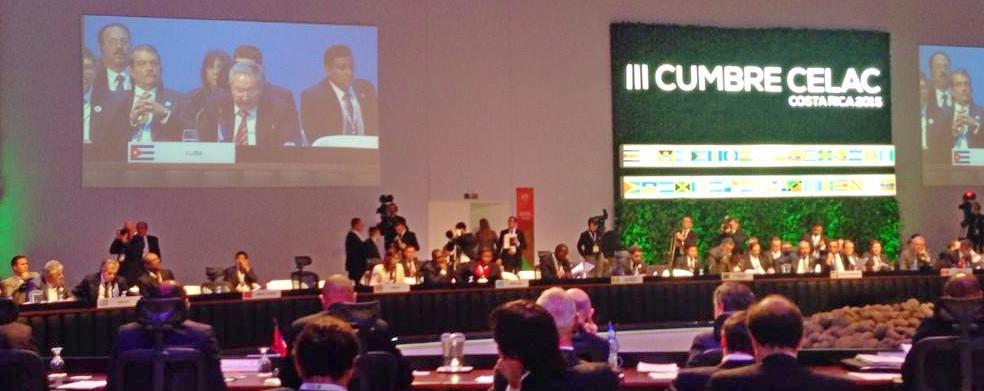
We express vigorous condemnation of the unacceptable and unjustified unilateral sanctions against the Bolivarian Republic of Venezuela, and the continuing external intervention aimed at creating a climate of instability in this sister nation.
Cuba, profoundly familiar with all these tales, having endured them itself for over 50 years, reiterates its firmest support to the Bolivarian Revolution and the legitimate government led by President Nicolás Maduro Moros.
We join the Argentine Republic in its claim to the Malvinas, South Georgia and the South Sandwich Islands and the surrounding maritime areas. We support the South American nation and its President Cristina Fernández, who faces attacks from hedge funds and the decisions of venal courts, in violation of the sovereignty of this country.
We reaffirm our solidarity with the people and government of Ecuador, led by Rafael Correa, in support of their demand for compensation for environmental damage caused by transnational Chevron in Ecuador's Amazon. As we have said before, the Community will be incomplete as long as Puerto Rico is absent. Its colonial situation is unacceptable, and its Latin American and Caribbean character leaves no room for doubt.
In the Colombian peace process, the agreements reached by the government and the Revolutionary Armed Forces of Colombia-People's Army in the conversations taking place in Havana are significant. Never before have they advanced so much in the direction of achieving peace.
Cuba, in its capacity as guarantor and venue of these talks, will continue providing the necessary facilities and contributing as much as possible to an end to the conflict, and the construction of a just and lasting peace in the sister nation of Colombia. We resolutely support, as we have done to date, the just demands of Caribbean countries for reparations for the damages caused by slavery and colonialism, as well as resolutely opposing the decision to deprive them of vital financial resources on the basis of technocratic pretexts characterizing them as middle-income countries. We recognize the excellent developments achieved in the CELAC-China Forum and regional links with the BRICS group.
We reiterate our concern regarding the enormous and growing military expenditures imposed on the world by the United States and NATO, such as the attempt to extend their aggressive presence to the borders of Russia, with which we have historic, fraternal and mutually beneficial relations. We energetically oppose the imposition of unilateral and unjust sanctions on this nation. The growing aggression of the NATO military doctrine and the development of unconventional warfare -- which have already had devastating consequences and grave results -- threaten peace and international security.
For Cuba, the principal of the sovereign equality of all states and peoples' right to self-determination is inalienable.
The United Nations General Assembly must use its faculties to safeguard international peace and security, given the Security Council's double standards, excesses and omissions.
Full membership must be offered to Palestine without further delay, to which the people and government of Cuba convey their solidarity.
The Security Council's veto, which ensures that Israel's crimes go unpunished, must end. Africa, where our roots also lie, does not need advice or interference, but the transfer of financial resources, technology and fair trade.
We will forever defend the legitimate interests of the nations with which we struggle, shoulder to shoulder, against colonialism and apartheid, and with which we maintain relations of fraternity and cooperation.
We always remember their unwavering solidarity and support. Cuba's voice will tirelessly defend just causes and the interests of Southern countries and will remain faithful to their objectives and common positions, in the knowledge that homeland is humanity.
 The foreign policy of the
Cuban Revolution will remain
faithful to its principles. Esteemed colleagues: Last December
17, saw the return to the homeland of Cuban anti-terrorists,
Gerardo Hernández, Ramón Labañino and Antonio
Guerrero, who
together with Fernando González and René González
are a source of
pride and an example of conviction.
The foreign policy of the
Cuban Revolution will remain
faithful to its principles. Esteemed colleagues: Last December
17, saw the return to the homeland of Cuban anti-terrorists,
Gerardo Hernández, Ramón Labañino and Antonio
Guerrero, who
together with Fernando González and René González
are a source of
pride and an example of conviction.
The President of the United States acknowledged the failure of the nation's policy toward Cuba, implemented for over 50 years, the country's complete isolation as a result; and the damages which the blockade has caused to our people. He has ordered a review of the obviously unjustifiable inclusion of the island on the list of state sponsors of international terrorism. Also on that day, he announced the decision to reestablish U.S. diplomatic relations with our government.
These changes are the result of almost a century and a half of heroic struggle and loyalty to principles of the Cuban people. They were also made possible thanks to the new era our region is experiencing, and to the firm, valiant demands made by the governments and peoples of CELAC.
These changes vindicate Our America, which worked in close collaboration, in the United Nations and all other spheres, to achieve this objective. Preceded by the Alba Summit in Cumaná, Venezuela, the discussions held in the 2009 Summit of the Americas in Puerto España, Trinidad and Tobago, led President Obama, at that time recently elected, to propose a new beginning with Cuba. In Cartagena, Colombia, in 2012, a strong debate took place in which the blockade was unanimously and categorically rejected, compelling an important U.S. leader to describe the occasion as the great failure of Cartagena, or disaster -- was the exact phrase -- and during which Cuba's exclusion from these events was debated.
Ecuador, in protest, had decided not to participate. Venezuela, Nicaragua and Bolivia stated that they would not attend another summit without the presence of Cuba, a sentiment which received support from Brazil, Argentina and Uruguay.
The Caribbean Community assumed a similar stance. Mexico and the remaining nations also agreed. Panamanian President, Juan Carlos Varela, before his inauguration, resolutely announced that he would invite Cuba, with full rights and equality of conditions, to the Seventh Summit of the Americas, and that is what he did.
Cuba immediately confirmed that it would attend. This demonstrates Martí's precision when he wrote, "One just principle from the depths of a cave is more powerful than an army." (Applause) To all those present, I express Cuba's most profound gratitude. To the 188 states which voted against the blockade in the United Nations; to those who made a similar demand at the General Assembly and international summits and conferences; and to all the popular movements, political forces, parliaments and personalities who tirelessly worked to achieve this objective, on behalf of Cuba, I sincerely thank you. To the people of the United States who expressed growing opposition to the hostile policy and the blockade, imposed for over five decades, I also convey our appreciation and friendly sentiments.
These outcomes show that governments with profound differences can find a solution to their problems, through respectful dialogue and exchanges on the basis of sovereign equality and reciprocity, for the benefit of their respective nations.
As I have repeatedly stated, Cuba and the United States must learn the art of civilized co-existence, based on respect for the differences which exist between both governments and cooperation on issues of common interest, which contribute to solving the challenges we are facing in the hemisphere and the world. However, it must not be supposed that, in order to achieve this, Cuba would renounce its ideals of independence and social justice, or abandon a single one of our principles, nor cede a millimeter in the defense of our national sovereignty.
We will not invite, or accept any attempt to advise or exert pressure regarding our internal affairs. We have earned this sovereign right through great sacrifices and at the price of great risks.
Could diplomatic relations be restored without resuming the financial services of the Cuban Interests Section and its Consular Office in Washington, denied as a consequence of the financial blockade? How can diplomatic relations be restored without removing Cuba from the list of state sponsors of international terrorism? What will be the future conduct of U.S. diplomats in Havana, in regards to observing the diplomatic and consular norms established by International Conventions?
This is what our delegation has said to the State Department during the bilateral talks held last week, and more meetings are required to address these issues.
We have shared with the President of the United States our willingness to advance toward normalization of bilateral relations, once diplomatic relations are reestablished, which would imply the adopting of measures by both parties to improve the climate between the two countries, to resolve other pending problems, and move forward on cooperation.
The current situation discreetly opens an opportunity for the hemisphere to encounter new, superior ways to cooperate, which would serve the two Americas. This would allow pressing problems to be resolved, and open new paths.
The text of the Proclamation of Latin America and the Caribbean as a Zone of Peace constitutes an indispensable foundation for this, including the recognition that every state has the inalienable right to choose its own political, economic, social, cultural system, without interference of any kind on the part of another state, which constitutes an undeniable principle of international law, The principal problem has not been resolved.
The economic, commercial and financial blockade, which causes great human and economic damage and violates international law, must end.
I remember the memorandum written by Undersecretary Mallory, in April of 1960, which, given the lack of an effective political opposition [in Cuba], proposed the objective of creating hunger, desperation and suffering to provoke the overthrowal of the revolutionary government. Now, everything seems to indicate that the objective is to create an artificial political opposition through economic, political and communications means.
The reestablishment of diplomatic relations is the beginning of a process which can progress toward normalization of bilateral relations, but this will not be possible as long as the blockade exists, or as long as the territory illegally occupied by the Guantánamo Naval Base is not returned (Applause), or radio and television broadcasts which violate international norms continue, or just compensation is not provided our people for the human and economic damage they have suffered.
It would not be ethical, just, or acceptable that something were requested of Cuba in return.
If these problems are not resolved, this diplomatic rapprochement between Cuba and the United States makes no sense.
Neither can it be expected that Cuba would agree to negotiate aspects mentioned with respect to our absolutely sovereign, internal affairs. Progress was made in these recent negotiations because we treated each other respectfully, as equals.
To continue advancing, this is how it must be. We have carefully followed the U.S. President's announcement of some executive decisions to modify certain aspects of the blockade's application. The measures announced are very limited.
Prohibitions on credit and the use of the dollar in international financial transactions remain in place; individual travel by U.S. citizens is hampered under the system of licenses for so-called people-to-people exchanges; these are conditioned by subversive goals; and maritime travel is not allowed.
Prohibitions remain on the acquisition in other markets of equipment and technology with more than 10% U.S. components, and on imports by the United States of goods containing Cuban raw materials, among many, many others. President Barack Obama could decisively use his broad executive powers to substantially modify the application of the blockade, that which is in his hands, even without a decision by Congress.
He could permit, in other sectors of the economy, all that he has authorized in the arena of telecommunications, with evident objectives of political influence in Cuba.
His decision to hold a discussion with Congress on eliminating the blockade is significant. U.S. government spokespeople have been very clear in specifying that they are now changing their methods, but not their policy objectives, and insist on continuing to intervene in our internal affairs, which we are not going to accept. Our U.S. counterparts should not plan on developing relations with Cuban society as if there were no sovereign government in Cuba. (Applause).
No one should dream that the new policy announced means acceptance of the existence of a socialist revolution 90 miles from Florida.
They want so-called civil society to be present at the Summit of the Americas in Panama, and this is what Cuba has always said. We have protested what has occurred at the World Trade Organization conference in Seattle, at the Summits of the Americas in Miami and Quebec, at the Copenhagen Climate Change Summit, and whenever the G-7 or International Monetary Fund meet, when civil society is placed behind steel fences, faces brutal police repression, or is confined to locations dozens of kilometers from the events.
Of course Cuban civil society will attend, and I hope there are no restrictions on our country's non-governmental organizations, which obviously have no interest, or any status within the OAS, but are recognized by the UN.
I hope to be able to see in Panama the popular movements and non-governmental organizations which advocate for nuclear disarmament, for the environment, against neoliberalism, the Occupy Wall Street and the indignados of this region, university and high school students, farmers, trade unions, communities of original peoples, organizations which oppose the contamination caused by fracking, those defending the rights of immigrants and denouncing torture and extrajudicial executions, police brutality, racist practices, those who demand equal pay for women for equal work, those demanding compensation for damage caused by transnational corporations. Nevertheless, the announcements made December 17 have generated world recognition, and President Obama has received very broad support within his own country. Some forces in the United States will try to abort this process which is beginning.
They are the same enemies of a just relationship between the United States and Latin America and the Caribbean, those who disrupt bilateral relations with many countries in our region with that nation, those who always blackmail and pressure.
We know that ending the blockade will be a long, difficult process, which will require the support, the mobilization and resolute action of all persons of good will in the United States and the world; approval on the part of the United Nations General Assembly, during its next session, of the resolution calling for its elimination; and in particular, concerted action by Our America.
Esteemed Heads of State and Government,
Dear friends,
We congratulate Costa Rica, President Solís and his government for the work done at the helm of CELAC. We welcome and offer our full support to Ecuador and President Correa, who will lead the Community in 2015. Many thanks. (Applause).
(Granma International. Photos: CELAC, Minrex)
Cuba
Fidel Castro's Defence of the Revolutionary Interest
The historic leader of the Cuban Revolution Fidel Castro sent the following message to the Federation of University Students on the occasion of an event commemorating the 70th anniversary of his admission to the University of Havana.
***
Dear compañeros,
In 2006, as a result of health issues which were incompatible with the time and effort required to fulfill my duties -- which I myself assumed when I entered this University September 4, 1945, 70 years ago -- I resigned from my official positions.
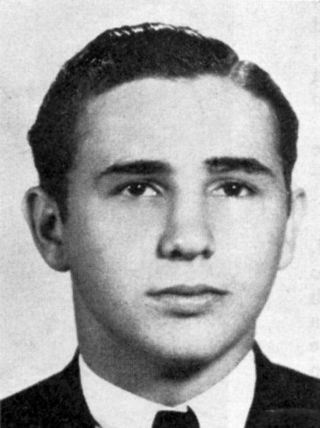 Fidel Castro from his student years at the
University of Havana, 1945-47
|
I was not the son of a worker, or lacking in material or social resources for a relatively comfortable existence; I could say I miraculously escaped wealth. Many years later, a richer and undoubtedly very capable U.S. citizen, with almost 100 billion dollars, stated -- according to a news agency article published this past Thursday, January 22 -- that the predominant system of production and distribution of wealth would, from generation to generation, make the poor rich.
Since the times of ancient Greece, during almost 3,000 years, the Greeks, without going very far, were brilliant in almost all activities: physics, mathematics, philosophy, architecture, art, science, politics, astronomy and other branches of human knowledge. Greece, however, was a land in which slaves did the most difficult work in fields and cities, while the oligarchy devoted itself to writing and philosophizing. The first utopia was written precisely for them.
Observe carefully the realities of this well-known, globalized and very poorly shared planet Earth, on which we know every vital resource is distributed in accordance with historical factors: some with much less than they need, others with so much they don't know what to do with it. Now amidst great threats and dangers of war, chaos reigns in the distribution of financial resources and social production. The world's population has grown, between 1800 and 2015, from one to seven billion inhabitants. Can this population increment be accommodated, in this way, over the next 100 years, and food, health, water and housing needs met, regardless of whatever scientific advances are made?
Well, setting aside these perplexing problems, it is astonishing to recall that the University of Havana, during the days when I entered this beloved, prestigious institution almost three-quarters of a century ago, was the only one in Cuba.
Of course, fellow students and professors, we must remember that it is not just one now, but rather more than 50 institutions of higher learning distributed across the entire country.
When you invited me to participate in the launch of the commemoration of the 70th anniversary of my admission to the University, which I was surprised to learn of, during days when I was very busy with various issues in which I can perhaps still be relatively useful, I decided to take a break and devote several hours to recalling those years.
I am overwhelmed recalling that 70 years have passed. In reality, compañeros and compañeras, if I were to register again at this age, as some have asked me, I would respond, without hesitation, that it would be to pursue scientific studies. I would say, like Guayasamín: Leave a little light on for me.
In those years, already influenced by Marx, I was able to understand more, and better, the strange, complex world in which it has befallen us to live. I may have harbored some illusions of the bourgeoisie, whose tentacles managed to entangle many students, when they possessed more passion than experience. The topic would be long and interminable.
Another genius of revolutionary action, founder of the Communist Party, was Lenin. Thus I did not hesitate a second when during the Moncada trial, when they allowed me to attend, albeit just one time, I stated before the judges and dozens of high ranking officials of the Batista regime that we were readers of Lenin.
We didn't talk about Mao Zedong, since the socialist revolution in China, inspired by the same principles, had not yet ended.
I insist, nonetheless, that revolutionary ideas must always be on guard as humanity expands its knowledge.
Nature teaches us that tens of billions of light years may have passed, and life in all of its expressions has always been subjected to an incredible combination of matter and radiation.
A personal greeting between the Presidents of Cuba and the United States took place at the funeral of Nelson Mandela, the distinguished, exemplary combatant against apartheid who had become friendly with Obama.
It is enough to indicate that, at that time, several years had passed since Cuban troops had decisively defeated the racist South African army, directed by the wealthy bourgeoisie, which had vast economic resources. This is a story of a conflict which has yet to be written. South Africa, the government with the most financial resources on the continent, had nuclear weapons supplied by the racist state of Israel, as the result of an agreement between this party and President Ronald Reagan, who authorized the delivery of devices for the use of such weapons to attack Cuban and Angolan forces defending the Popular Republic of Angola against racist troops attempting to occupy the country.
Thus peace negotiations were excluded while Angola was attacked by apartheid forces, with the best trained and equipped army on the African continent.
In such a situation, there was no possibility whatsoever for a peaceful solution. Continual efforts to liquidate the Popular Republic of Angola, to bleed the country systematically with the power of that well-equipped and trained army, was what led to the Cuban decision to deliver a resounding blow to the racists at Cuito Cuanavale, the former NATO base which South Africa was attempting to occupy at all costs.
That powerful country was obliged to negotiate a peace agreement which put an end to the military occupation of Angola, and an end to apartheid in South Africa.
The African continent was left free of nuclear weapons. Cuba was forced to face, for a second time, the threat of a nuclear attack.
Cuban internationalist troops withdrew from Africa with honor.
Then Cuba survived the Special Period in peace time, which has already lasted for more than 20 years, without raising the white flag, something we have never done, and will never do.
Many friends of Cuba know of the Cuban people's exemplary conduct, and I will explain to them, in a few words, my essential position.
I do not trust the policy of the United States, nor have I exchanged one word with them, though this does not in any way signify a rejection of a peaceful solution to conflicts or threats of war. Defending peace is the duty of all. Any negotiated, peaceful solution to the problems between the United States and peoples, or any people of Latin America, which does not imply force or the use of force, must be addressed in accordance with international principles and norms.
We will always defend cooperation and friendship with all of the world's peoples, and with those of our political adversaries. This is what we are demanding for all.
The President of Cuba has taken pertinent steps in accordance with his prerogatives and faculties conceded by the National Assembly and the Communist Party of Cuba.
The grave dangers which today threaten humanity must yield to norms which are compatible with human dignity. No country can be denied such a right.
In this spirit I have struggled, and will continue to struggle, to my last breath.
Fidel Castro Ruz
January 26, 2015,
12:35 p.m.
Rising to the Challenge: Raúl Castro at CELAC
As the Cuban expression goes, Raúl Castro "upped the ante" on President Obama in his speech at the recent meeting of CELAC in Costa Rica. Not that these matters wouldn't have been spoken of by the Cuban delegation during the negotiations, but now President Raúl has declared them to be conditions, clearly aware that it would not make sense to sit down and negotiate anything if these issues are not resolved.
All the problems Raúl referred to are unquestionably of historical political weight:
- Lift the blockade.
- Give back Guantanamo Naval Base.
- Remove Cuba from the list of terrorist countries.
- Compensate Cubans for the damage the U.S. policy has caused them over all these years.
 Resolution of the
accumulated problems between Cuba and the United
States demands determination and patience. The blockade is a set of
laws,
regulations, proclamations, etc. that are not easily addressed. But the
President
holds the main strings that could be pulled if he really wants to
resolve the
problems.
Resolution of the
accumulated problems between Cuba and the United
States demands determination and patience. The blockade is a set of
laws,
regulations, proclamations, etc. that are not easily addressed. But the
President
holds the main strings that could be pulled if he really wants to
resolve the
problems.
Pulling those strings through use of the president's executive powers would mean that only the central core of the blockade would remain, the intertwining of the Torricelli and Helms Burton laws, which would be able to do very little damage to Cuba anymore if the president proceeded to cut off their tentacles. There are many issues that the president could solve using his executive power. Not a few people have taken it upon themselves to tell him that.
Of the demands put forward by Raúl, in reality the most difficult one is only the blockade. The others, with the exception of the compensation, which would require more complex negotiations, could be done with a stroke of the president's pen as there is no justification whatsoever for Cuba to be on the list of terrorist countries; nor is there any defence for the continuation of the Guantanamo Naval Base. The pending migration issues with Cuba are not difficult to resolve either. Especially taking into consideration that certain privileges granted to [Cubans] serve to aggravate the migratory problems with the other Hispanics.
We practically already have diplomatic relations from the moment when we decided to sit down at the negotiating table; but we will not have normalization of diplomatic relations until the issues raised by Raúl are resolved.
The way the first rounds of conversations were organized Obama seemed to think that at least having embassies would be a quick process.
Such that J. Kerry had already announced his possible trip to Cuba to inaugurate the U.S. embassy. Knowing the mentality of the U.S. government bureaucracy with reference to Cuba for many years, it is plausible to imagine they thought that Cuba was desperate, willing to accept anything. More than a few times they have thought that and even said it, even though the same thing always happens. Their wishes never come true.
 Obama must reflect seriously
on what Raúl Castro has demanded, and
more than anything, about how much would be lost if those demands held
back the progress of negotiations. The things Cuba is demanding are too
much
about principles for the United States to imagine that the island would
give in,
especially when Cuba has never yielded.
Obama must reflect seriously
on what Raúl Castro has demanded, and
more than anything, about how much would be lost if those demands held
back the progress of negotiations. The things Cuba is demanding are too
much
about principles for the United States to imagine that the island would
give in,
especially when Cuba has never yielded.
As well, this approach by Raúl Castro dashes all hope that the so-called dissidents could benefit from the negotiations. And that the U. S. could manage to organize them to become a "fifth column," now acting from within, to carry out the plans for "regime change."
It does not take much to realize that Obama, starting on December 17, continuing with the measures adopted on January 18, and then at his State of the Union of January 22, 2015, has been very clear and consistent in saying that his change in policy is about the need to use new methods with the same strategy.
That is to say that his methods seek to empower Cuban civil society so that it is less dependent on the Cuban state every day; strengthen private property and arrive at a democratic Cuban society with human rights and individual freedoms, close to the United States. It would be absurd, as Raúl said, even to dream that the U.S. is willing to have a socialist society ninety miles from its territory. There is a level of stubbornness that keeps Obama sticking to the same objectives as those of the early nineteenth century. They recognize that for 54 years their policy with Cuba has been a failure and has isolated them. But their mentality and imperial aims will not allow them to do anything different, because it would be like denying their own nature.
So, I don't believe we can count on the good will of the United States; this second round will only end in Cuba's favour if, along with the factors that Raúl mentioned in his speech and which forced a change of policy on Obama, she is able to push for solutions.
TML Note
The title of this article in Spanish is: "La Pica en Flandes: Raul Castro en CELAC" which translates literally to "The Spears in Flanders: Raul Castro at CELAC." The Spanish expression "poner una pica en Flandes" is used when something is very difficult to achieve. It refers to the time in Spain, under Philip IV, when it was nearly impossible to get recruits to fight in the Tercios de Flandes, the name given to the Spanish army sent to fight in the Netherlands -- in Flanders and elsewhere. To get these recruits (who would fight with spears or lances) was considered a real feat, given the challenges they had to face.
(Writers and Artists Union of Cuba, Havana, January 29, 2015. Translated from the original Spanish by TML.)
Saturday, January 31, 2015 -- 7:00 pm
AUUC Hall, 1604 Bloor Street West.
Celebrating the January 28, 1853 date of birth of José Martí,
Cuba's national hero and father of independence.
For information and ticket prices: Ardis 416-534-5340, Sharon 905-951-8499
Halifax
Ebola, the Cuban Revolution & African Liberation
Public Lecture by Dr. Isaac Saney, Cuba specialist
Dalhousie University, 6100 University Avenue
Organized by: JRJ Chair of Black Canadian Studies, Dalhousie University.

Cuba's Henry Reeves medical brigade arrives in Sierra Leone, October 3, 2014,
to help in the fight against the Ebola epidemic. (WHO)
In 2014, the small island nation of Cuba responded without hesitation to the Ebola epidemic in the West African nations of Guinea, Liberia & Sierra Leone. The Cuban medical mission is by far the largest sent by any country. Standing side-by-side with the peoples of West Africa, 461 Cuban doctors and nurses -- chosen from more than 15,000 volunteers -- have gone to West Africa and joined the struggle against Ebola. Havana's contribution is to be contrasted with that of Washington, which dispatched thousands of soldiers, instead of more desperately needed healthcare personnel and resources.
At the September 16, 2014 meeting of the United Nations Security Council, Cuban representative Abelardo Moreno declared: "Humanity has a debt to the African people. We cannot let them down."
Saney will explore the history and impressive dimensions of the Cuban Revolution's solidarity with Africa. Saney is the co-chair and National Spokesperson for the Canadian Network on Cuba. He is the author of the widely acclaimed book, Cuba: A Revolution in Motion (Zed, 2004)
Read The Marxist-Leninist Daily
Website: www.cpcml.ca
Email: editor@cpcml.ca
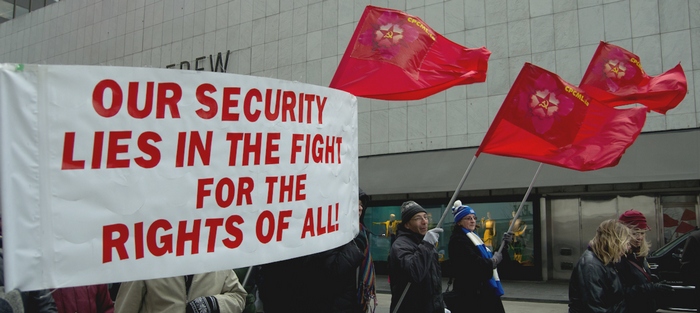
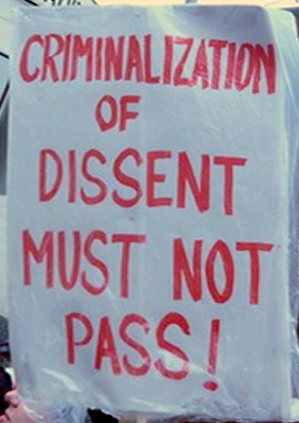
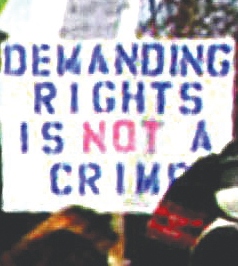
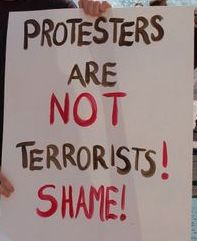
 Responding to a question on
the measures to criminalize the "promotion
of terrorism," Harper said that it does not matter what age a person
is,
"whether they're in a basement or a Mosque, if you advocate or promote
terrorism it is... it will be, a serious offence. We do not tolerate
this. Anyone
who engages in this activity will face the full force of the law in the
future..."
He ominously warned of more measures to come saying, "Terrorists
themselves will adjust to the legislation and find other ways of
evolving."
Responding to a question on
the measures to criminalize the "promotion
of terrorism," Harper said that it does not matter what age a person
is,
"whether they're in a basement or a Mosque, if you advocate or promote
terrorism it is... it will be, a serious offence. We do not tolerate
this. Anyone
who engages in this activity will face the full force of the law in the
future..."
He ominously warned of more measures to come saying, "Terrorists
themselves will adjust to the legislation and find other ways of
evolving."
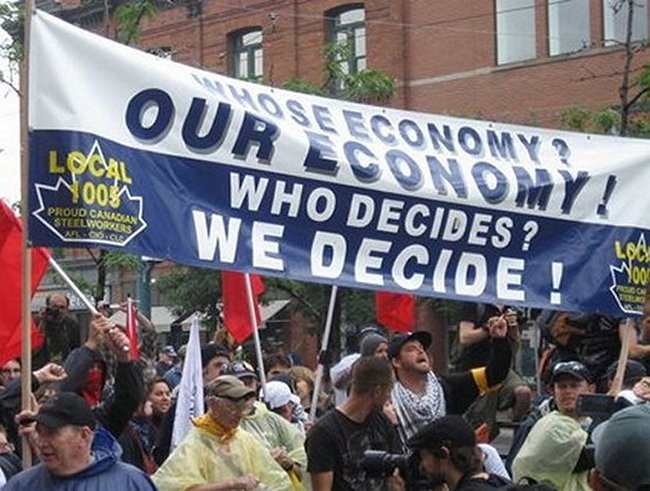 The ruling social class and
its political elite present
politics as a choice
between a given this or that. Choose this or that the people are told.
The this
and the that are preordained with no alternative allowed to muscle its
way into
the debate. Vote for this cartel party or that cartel party; the choice
is clear.
Feel good or bad about this leader or that leader, this man or that
woman running
for office; all that matters is your sentiment, your subjective
response to
external stimuli from TV and other media. Suffice it to say the root of
a
problem is not presented for discussion let alone analysis or
resolution,
democratic renewal or a change in the direction of the economy. Take
for
example the federal budget.
The ruling social class and
its political elite present
politics as a choice
between a given this or that. Choose this or that the people are told.
The this
and the that are preordained with no alternative allowed to muscle its
way into
the debate. Vote for this cartel party or that cartel party; the choice
is clear.
Feel good or bad about this leader or that leader, this man or that
woman running
for office; all that matters is your sentiment, your subjective
response to
external stimuli from TV and other media. Suffice it to say the root of
a
problem is not presented for discussion let alone analysis or
resolution,
democratic renewal or a change in the direction of the economy. Take
for
example the federal budget.